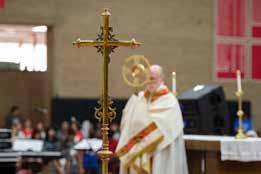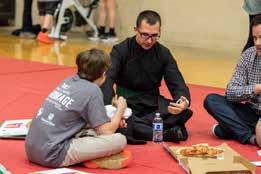






2024
Volume 33 • NUMBER 11
1123 S. CHURCH ST. CHARLOTTE, N.C. 28203-4003 catholicnews@charlottediocese.org
PUBLISHER
The Most Reverend Peter J. Jugis Bishop of Charlotte
his month is dedicated to St. Joseph, the earthly father of Jesus and spouse of the Blessed Virgin Mary. His March 19 feast, a solemnity, is a respite in the penitential season of Lent as we celebrate his fatherly role in the Holy Family and the Church as a whole. Turn to St. Joseph this month – and always – to find a confidante who understands your struggles, sorrows, needs and joys, and takes them to Our Father in heaven. Celebrate one of our most powerful intercessors with these ideas.

STAFF
EDITOR: Spencer K. M. Brown 704-808-4528, skmbrown@rcdoc.org
ADVERTISING MANAGER: Kevin Eagan 704-370-3332, keeagan@rcdoc.org
HISPANIC MEDIA MANAGER: César Hurtado 704-370-3375, rchurtado@rcdoc.org
MULTIMEDIA DESIGNER: David Puckett
704-808-4521, dwpuckett@rcdoc.org
EDITORIAL TEAM: Kimberly Bender 704-370-3394, kdbender@rcdoc.org
Annie Ferguson 704-370-3404, arferguson@rcdoc.org
Troy C. Hull
704-370-3288, tchull@rcdoc.org
Christina Lee Knauss 704-370-0783, clknauss@rcdoc.org
COMMUNICATIONS ASSISTANT/CIRCULATION: Erika Robinson 704-370-3333, catholicnews@rcdoc.org
COMMUNICATIONS DIRECTOR: Liz Chandler 704-370-3336, lchandler@rcdoc.org
ASSISTANT COMMUNICATIONS DIRECTOR: Patricia L. Guilfoyle 704-370-3334, plguilfoyle@rcdoc.org
THE CATHOLIC NEWS HERALD is published by the Roman Catholic Diocese of Charlotte 26 times a year.
NEWS: The Catholic News Herald welcomes your news and photos. Please e-mail information, attaching photos in JPG format with a recommended resolution of 150 dpi or higher, to catholicnews@rcdoc.org.
1 2
FIND A FATHER AND FRIEND IN ST. JOSEPH
In “Befriending St. Joseph: Finding Faith, Hope and Courage in the Seven Sorrows Devotion,” author Deacon Greg Kandra leads readers on a journey of spiritual renewal through the few Bible stories that include St. Joseph. The book offers a fresh take on the centuriesold devotion known as the Seven Sorrows of St. Joseph and provides an opportunity to ponder Joseph’s role in salvation and ways to become more like him. Through guided reflections, readers will imagine what life may have been like for Joseph, Mary and Jesus and will receive guidance to better navigate life, focusing on trust, purity of heart, courage and persistence in faith.
WATCH A BIOPIC OF ‘OUR SPIRITUAL FATHER’
The Knights of Columbus produced an hour-long film about the life of St. Joseph and how to cultivate devotion to this great saint. The film, “St. Joseph: Our Spiritual Father,” originally released in 2021 on ABC affiliated stations and directed by David Naglieri, features reenactments, interviews with scholars, and testimonies of people with a devotion to St. Joseph. The documentary is available for free on the Knights of Columbus YouTube channel.

DELIGHT IN ITALIAN SWEETS MARCH 19
The biggest St. Joseph celebrations are likely in Italy, where they honor the foster father of Jesus and all fathers on March 19, the Solemnity of St. Joseph. You may have heard of zeppole, a donut-like pastry being served on this day, but have you ever tried Sfince di San Giuseppe? The pastry is pronounced “sfeen-chay,” meaning fried cream puffs. They are like Neapolitan zeppole, but instead of being shaped into rings and filled with pastry cream, they are filled with sweetened ricotta cream and served with crushed pistachios and candied citrus fruits. Try the recipe at www.ItalyMagazine.com.

VIÑEDO DE RAQUEL : ¿Es usted o un ser querido que busca la curación de los efectos de un aborto anterior? Los retiros de fin de semana son ofrecidos por Caridades Católicas para hombres y mujeres en todas las regiones de la Diócesis de Charlotte. Para obtener información, comuníquese con Karina Hernández: 336-2671937 o karinahernandez@live.com.
LENTEN MISSION, ‘CONTEMPLATION AND ST. JOHN’S GOSPEL’: March 3-6, St. Leo the Great Church, 335 Springdale Ave., WinstonSalem, will host Father Matthew Kauth to offer a Lenten Mission series, “Contemplation and St. John’s Gospel.” Father Kauth will offer the homily at the 7:30, 9, 10:30 a.m. and noon Masses on Sunday, March 3. He will offer talks at 8:30 a.m. and 6 p.m. in the church, March 4-6.
LENTEN
ON ST. JOSEPH : March 9-13 at Our Lady of Grace Church, 2203
Go visit one of the diocese’s St. Josephs, which include the majestic St. Joseph College Seminary in Belmont, the historic St. Joseph Church in Mount Holly, and six parishes bearing the name St. Joseph in Asheboro, Bryson City, Charlotte, Eden, Kannapolis and Newton. You can find them at www.charlottediocese. com/find-parish. For more about this week’s recommendations, go to www. catholicnewsherald. com.
— Annie FergusonW. Market St., Greensboro. Join Father Daniel Brandenburg, the author of “Lessons from the Workshop of St. Joseph,” where he will deliver a homily series at all weekend Masses and Lenten mission lectures during the week. The homily series will be held at Masses March 9-10. A potluck and lecture will be held 6:30-8 p.m. March 11, followed by lectures beginning at 7 p.m. March 12 and 13. All lectures will be held in the Our Lady of Grace Parish Life Center.
11TH ANNUAL EAST MEETS WEST RETREAT: 9:30 a.m.-12:15 p.m.
June 22, Foothills Equestrian Nature Center, 3381 Hunting Country Road, Tryon. Father Christiaan Kappes will give three talks on St. Gregory Palamas and his homilies on Mary, the Mother of God.
The East Meets West Retreat is an annual event of Holy Apostle and Evangelist Luke Ukrainian Catholic Mission, which serves the Greater Asheville area. For details, contact Father Kevin Bezner at ucmcanton@gmail.com.

Bishop Peter J. Jugis
7 – 10 A.M.
On March 3, the Church celebrates the feast of St. Katharine Drexel, a Philadelphia heiress who abandoned her family’s fortune to found an order of sisters dedicated to serving the impoverished African American and Native American populations of the United States.
St. Katharine Drexel was born Nov. 26, 1858, into the affluent Philadelphia Drexel family. Despite their wealth, the family was very pious, and Katharine was taught charity at an early age. Her mother opened up the family house three times a week to feed and care for the poor, and her father had a deep personal prayer life. During the summer months, Katharine and her sisters taught catechism classes to the children of the workers on her family’s summer estate.
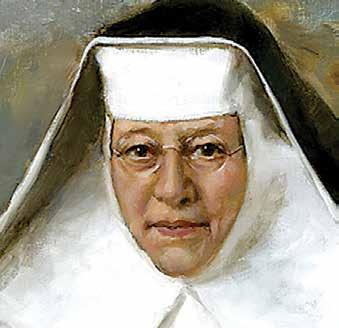
The young heiress was considering a vocation to the contemplative life when she was given the opportunity to travel to Europe and have an audience with the pope. During the audience, she asked Pope Leo XIII to send missionaries to Wyoming. He replied by asking her why she didn’t found an order to do exactly that.
Upon her return home, Katharine began working as a layperson for the improvement of the conditions and education of African Americans and Native Americans. Eventually, her work led her to found the Sisters of the Blessed Sacrament, who are dedicated to sharing the message of the Gospel and the Life of the Eucharist with African Americans and Native Americans.
During her lifetime, she oversaw the opening and maintenance of almost 60 schools and missions, most of which were located in the western and southwestern United States.
From the age of 33 until her death in 1955, she dedicated her life and a fortune of $20 million to this work. In 1894, she took part in opening the first mission school for Native Americans, in Santa Fe, N.M. Other schools quickly followed for Native Americans west of the Mississippi River and for blacks in the South. In 1915 she also founded Xavier University in New Orleans. At her death
MARCH 3-9
Sunday (Third Sunday of Lent): Exodus 20:1-17, 1 Corinthians 1:22-25, John 2:13-25; Monday (St. Casimir): 2 Kings 5:1-15ab, Luke 4:24-30; Tuesday: Daniel 3:25, 34-43, Matthew 18:21-35; Wednesday: Deuteronomy 4:1, 5-9, Matthew 5:17-19; Thursday (Sts. Perpetua and Felicity): Jeremiah 7:23-28, Luke 11:14-23; Friday (St. John of God): Hosea 14:2-10, Mark 12:28-34; Saturday (St. Frances of Rome): Hosea 6:1-6, Luke 18:9-14
there were more than 500 sisters teaching in 63 schools throughout the country.
She was forced into retirement for the last 20 years of her life after she was debilitated by a severe heart attack. Though she was not able to actively lead the order, she left the sisters with her charism of love and concern for the missions.
She died on March 3, 1955, and was canonized by Pope John Paul II on Oct. 1, 2000.
Bishop Peter Jugis gave students in the diocese’s Catholic Schools a “Bishop’s Day off from school” on Monday, March 4, in honor of the feast of St. Katharine Drexel. The gesture honors the special connection the saint has to the diocese, as well as the schools’ mission as educators and the hard work of students as they pursue their vocations and academic excellence.
The extraordinary philanthropist and advocate for the poor contributed funds to help support four churches in western North Carolina – all with the stipulation that black and white Catholics should be able to worship together.
When the Benedictines were building the second St. Peter Church in Charlotte in 1892 (after the first one was demolished), she gave them money to buy the pews – the same pews still in use today.
A year later, Abbot Leo Haid, the founding abbot of Belmont Abbey, ran out of money while trying to build the Church of Maryhelp (now known as Mary, Help of Christians Basilica). With the help of his fellow Benedictine clergy at St. Peter Church, Abbot Haid secured a $4,000 donation from Mother Drexel to help fund the construction, as long as it had pews for African Americans.
Abbot Haid also recognized the importance of breaking down “the ugly prejudices” against African Americans, and in 1904, when Mother Drexel visited Belmont Abbey, she found an entire row of pews running the length of the abbey church exclusively for African Americans.
In 1899, Mother Drexel also donated funds to build St. Benedict Church in Greensboro, again with the stipulation that pews be reserved for African Americans and that the “same care and attention” white people received would be extended to African Americans.
And in 1900, she sent another $1,500 to the Benedictine monks at Belmont Abbey so they could build a church in nearby Gastonia. They named it St. Michael Church.
— Catholic News Herald

Arriving in a wheelchair instead of walking with his cane, Pope Francis began his weekly general audience by telling visitors and pilgrims, “I’m still a bit sick,” so an aide would read his prepared text.
The pope had canceled his appointments Feb. 24 and Feb. 26 because of what the Vatican press office described as “mild flu-symptoms.”
Pope Francis’ main audience talk on Feb. 28 focused on envy and vainglory, or exaggerated pride, as part of his continuing series of audience talks about vices and virtues.
Envy and vainglory “go hand in hand,” the pope wrote. “Together these two vices are characteristic of a person who aspires to be the center of the world, free to exploit everything and everyone, the object of all praise and love.”
Reading the Book of Genesis, envy appears to be “one of the oldest vices: Cain’s hatred of Abel is unleashed when he realizes that his brother’s sacrifices are pleasing to God,” he wrote.
“The face of the envious man is always sad: he’s always looking down, he seems to be continually investigating the ground; but in reality, he sees nothing, because his mind is wrapped up in thoughts full of wickedness,” he said. “Envy, if unchecked, leads to hatred of the other. Abel would be killed at the hands of Cain, who could not bear his brother’s happiness.”
The root of the vice and sin of envy, he said, “is a false idea of God: we do not accept that God has His own ‘math.’”
MARCH 10-16
Sunday (Fourth Sunday of Lent): 2 Chronicles 36:14-16, 19-23, Ephesians 2:4-10, John 3:14-21; Monday: Isaiah 65:17-21, John 4:43-54; Tuesday: Ezekiel 47:1-9, 12, John 5:1-16; Wednesday: Isaiah 49:8-15, John 5:1730; Thursday: Exodus 32:7-14, John 5:31-47; Friday: Wisdom 2:1a, 12-22, John 7:1-2, 10, 25-30; Saturday: Jeremiah 11:18-20, John 7:40:53
More online
At www.katharinedrexel.org : Learn more about the Katharine Drexel Mission Center and National Shrine in Bensalem, Pa., which offers retreat programs, historic site tours, days of prayer, presentations and lectures about her legacy. Her tomb lies under the main altar in St. Elizabeth Chapel.
MARCH 17-23
Sunday (Fifth Sunday of Lent): Jeremiah 31:31-34, Hebrews 5:7-9, John 12:20-33; Monday (St. Cyril of Jerusalem): Daniel 13:19, 15-17, 19-30, 33-62, John 8:1-11; Tuesday (St. Joseph): 2 Samuel 7:4-5a, 12-14a, 16, Romans 4:13, 16-18, 22, Matthew 1:16, 18-21, 24a; Wednesday: Daniel 3:14-20, 91-92, 95, Daniel 3:52-56, John 8:31-42; Thursday: Genesis 17:3-9, John 8:51-59; Friday: Jeremiah 20:10-13, John 10:31-42; Saturday (St. Turibius of Mogrovejo): Ezekiel 37:2128, Jeremiah 31:10-13, John 11:45-56
As an example, Pope Francis cited the parable from Matthew 20:1-16 about workers hired at different times of the day to work in a vineyard, but the owner pays them all the same.
When those who worked longest protest, the owner says, “Am I not allowed to do what I choose with what belongs to me? Or do you begrudge my generosity?”
“We would like to impose our own selfish logic on God; instead, the logic of God is love,” the pope’s text said. “The good things He gives us are meant to be shared. This is why St. Paul exhorts Christians, ‘Love one another with brotherly affection; outdo one another in showing honor.’ Here is the remedy for envy!”
Pope Francis described vainglory as “an inflated and baseless self-esteem,” which leads to having no empathy and to seeing others only as objects to be used.
The vainglorious person “is a perpetual beggar for attention,” and when recognition is not given, “he becomes fiercely angry.”
A wise person recognizes, as St. Paul did, that freedom comes from recognizing one’s weaknesses and failures, relying only on God for strength, Pope Francis’ text said.
For the latest news 24/7: catholicnewsherald.com
In Brief
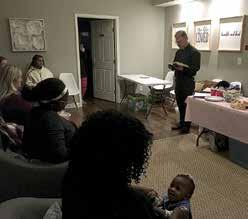
St. Mark Parish sponsors dinner for moms and their babies
HUNTERSVILLE — Deacon Thomas and Heather Martin of St. Mark Church visited the Community Pregnancy Center of Lake Norman in Huntersville Feb. 13 as part of its monthly dinner honoring moms who choose life for their babies. Deacon Martin offered a scriptural reflection while Heather Martin performed an inspirational song about the importance and sanctity of life. Each month Community Pregnancy Center invites different church groups around the community to sponsor the dinner. The dinner was provided by the Ladies Auxiliary of the Knights of Columbus at St. Mark Parish.
— Mike FitzGeraldLINCOLNTON — All are invited to a public prayer event Saturday, March 16, at Courthouse Square in Lincolnton. From noon to 1 p.m., prayers including the Rosary will be prayed for a conversion of hearts back to God. Since last year a group of believers in the power of prayer have gathered one Saturday each month on the square in downtown Lincolnton to pray for a local, national and worldwide return to God. While this monthly prayer hour was started by members of St. Dorothy Parish, all are welcome. The prayer vigil will be held on the east side of Courthouse Square facing East Main Street in downtown Lincolnton.
— The Lincoln Herald
CHARLOTTE — The Vigil of the Two Hearts will be offered this Friday and Saturday, March 1-2, at St. Patrick Cathedral. The celebrant for the 8 p.m. First Friday Mass on March 1 will be Father Ernest Nebangongnjoh, parochial vicar at the cathedral. From 9 p.m. Friday until 8 a.m. Saturday, there will be Eucharistic Adoration. The prayer event concludes with 8 a.m. Mass, March 2. The Vigil of the Two Hearts unites devotion to the Sacred Heart of Jesus and the Immaculate Heart of Mary, organized around First Friday and First Saturday Masses with overnight Eucharistic Adoration in between, to unite people in prayer and penance. For details, go to www. prolifecharlotte.org/two-hearts.
—
CHARLOTTE — For Father Yves Ilapi Kennedy, trust in God has always guided him, especially now in a new assignment nearly 7,000 miles from his home.
Father Kennedy has been commissioned by his bishop in the Diocese of Idiofa, in the Democratic Republic of the Congo, to minister to French-speaking Catholic immigrants in the Charlotte area and to help develop the Francophone ministry based out of Our Lady of Consolation Parish in Charlotte.
The growing French-speaking Catholic population in Charlotte includes people from Togo, Senegal, Cameroon and particularly Father Kennedy’s home country, the Democratic Republic of the Congo. Many of them have found a new church home at Our Lady of Consolation Parish, where Father Basil Sede – himself from Cameroon – serves as pastor.
But the barriers to ministering to these Catholic immigrants had proven difficult, Father Kennedy and Father Sede note.
“Many of the immigrants found it difficult to understand the Mass in English, and as a result they were leaving the Catholic Church for other churches with African congregations, where they found each other both in language and atmosphere,” Father Kennedy said.
So, some Charlotte-area Catholics from Congo reached out to Bishop José Moko of the Idiofa diocese to describe their situation. Bishop Moko and Charlotte Bishop Peter Jugis discussed the possibility of a Frenchspeaking priest coming to minister here, and Father Kennedy was chosen for the task.
The Francophone ministry is a first for the Diocese of Charlotte – the latest effort in its long-standing commitment to meet the spiritual needs of an increasingly diverse Catholic populace. That diocesan support already includes language-specific ministries to Hispanic, Nigerian, Vietnamese, Korean, Burmese and Hmong Catholics, as well as partnerships with other bishops to serve
Ukrainian, Indian, Eritrean and Maronite Catholics who live here.

Father Kennedy was born in Idiofa in southwestern Congo, the youngest of five children in a Catholic family. He studied scientific humanities at the Minor Seminary of Sainte Therese de l’Enfant Jesus de Laba in the Idiofa diocese. He then started his philosophy training at the Major Seminary of Saint Augustin de Kalona and completed his studies at the Catholic University of Congo, where he graduated in 2014. He then studied four years of theology at the Major Seminary of Saint Cyprien de Kikwit. He was ordained a priest on July 15, 2018, in Idiofa. After ordination, he worked as a formation director and teacher at the Saint Augustin de Kalona seminary for two years, then served as secretary to the bishop and chancellor of the Idiofa diocese until last year.
Since his arrival in the U.S. last November, Father Kennedy said he has quickly discovered the diversity of French speakers in Our Lady of Consolation’s congregation and in the wider Charlotte community.
“The Francophone community was originally intended to be mainly a Congolese community, but it became clear that the difficulties experienced by Congolese were also experienced by other French speakers,” he said. “The diocese decided to include all French speakers in the community, and it now includes people from Togo, the Ivory Coast, Guinea, Senegal, French-speaking Cameroonians and Haitians.”
Father Kennedy now offers Mass in French at 2 p.m. on the first and third Sundays of the month at Our Lady of Consolation Church and is planning to start additional spiritual activities in French for the growing community –including Eucharistic Adoration, regular confession times, retreats, prayer services,
and pastoral care for the sick.
“My greatest joy is that I am truly fulfilling my mission as a priest and living it out among brothers and sisters from all walks of life,” he said. “Not only do I lead the people to God, but I am helping the people understand the true value of the Mass and sacraments. They can easily ask for pastoral assistance without language limitations now. My greatest objective is to bring the Lord and His Church to a greater number of people, especially those who no longer come because of the language barrier.”
Father Kennedy said his devotion to the Eucharist and to the Blessed Virgin Mary helped him grow spiritually – first as a seminarian, and now in his work as a priest. His work to develop worship opportunities for French-speaking Catholics, particularly the Congolese community, has had the normal ups and downs of a nascent mission. The number of people who attend Mass and Adoration in French varies and sometimes crowds are small, he said, but he views his efforts through the lens of Scripture.
“While I pray that the Lord will make it grow, I remain attentive to the words of Christ, who says that ‘If two or three are gathered in my name, I am in their midst,’” he said. “It has to be said that the Congolese community is in its infancy and that there is still a lot to do. What we must recognize is that compared with the first day of activities, there has been an evolution in the membership. That’s why I know that this is God’s work and it will continue to grow. I find joy in the mission entrusted to me.”
If you would like to participate, support or learn more about Father Kennedy’s new mission to French-speaking Catholics in the Charlotte area, please call Our Lady of Consolation Parish office at 704-375-4339 or email olccharlotte@ rcdoc.org.
CHARLOTTE — Catholic Charities Diocese of Charlotte has been awarded the Platinum Seal of Transparency from Candid. This designation is granted to nonprofit organizations that surpass expectations by providing clear and open information about their governance, finances and impact.
“This prestigious recognition is a testament to our commitment to transparency and accountability in all aspects of our work,” said Catholic Charities’ Executive Director Gerry Carter. “This honor humbles us, and we will continue to uphold these values in all we do.”
Candid is a respected organization in

the nonprofit world, offering resources, training and data to help nonprofits find funding opportunities and improve their visibility to donors. To earn the Platinum Seal of Transparency, Catholic Charities underwent an evaluation of its mission, programs, finances and leadership by Candid’s team of experts.
For nonprofit organizations such as Catholic Charities, the Platinum Seal from Candid is the most distinguished recognition of good governance and

integrity.
“We are truly grateful to our supporters who have placed their trust in us,” said Virginia Garramone, Catholic Charities’ development director. “I know our supporters appreciate our dedication to transparency, which continues to give them the confidence to support our work and know it’s making a meaningful difference.”
— Catholic News Herald
MONROE — A chance meeting at a New York airport has delivered countless blessings for the faithful and the poor in Union County.
Father Richard Ho Lung of Jamaica had traveled to the big city in 2008 in hopes of establishing a mission in the U.S., but unsuccessful, he was headed back home when he ran into Bishop Peter Jugis as both prepared to board flights.
Father Ho Lung introduced himself as the founder and superior of the Missionaries of the Poor, based in Jamacia with missions established around the world.
The two men “spoke for a while,” says former Brother Augusto Silot, “and Bishop Jugis invited Father Ho Lung to visit Charlotte.”
The moment led the religious community to establish its only U.S. mission in Union County – where Bishop Jugis once served as pastor of Our Lady of Lourdes Parish.
Today, the ministry is thriving as the Missionaries of the Poor prepares to celebrate 15 years of cultivating community among friends, volunteers and parishioners of the church – who week after week reach out to the most vulnerable among us.
“The Missionaries of the Poor are truly worthy of their name,” said Father Benjamin Roberts, current pastor of Our Lady of Lourdes. “They do extraordinary work for the poor and immigrant communities and are in communion with us. We have been blessed by the presence of the brothers and their community.”
Although only four brothers serve in the mission, their community of local missionaries offer worship, prayers, catechesis and activities for the poor and growing immigrant community. They regularly host community meals and deliver food packages, and they visit the sick and homebound.
The Missionaries of the Poor were moved by the people they met and poverty they saw in Union County. After conversations and exploring the territory, Bishop Jugis invited the brothers to settle in Monroe and begin their work.
Our Lady of Lourdes parishioner Rosa Elba Gutierrez remembered the early days after the brothers’ arrival in 2009.
“They came to the parish and our pastor at the time, Father James Cassidy, let them stay in the parish rectory for as long as they needed,” Gutierrez recalled. “I drove them in my car through the streets of Monroe, looking for a piece of land or a house for their mission.”
Thanks to generous donors, just six months later, the brothers were able to find a house and land on Griffith Road in Monroe, where they still reside today.
The brothers repaired the house and transformed the rugged, wooded lot into a vast garden where they now grow vegetables and raise chickens as part of their ministry. They also built a chapel on the property to minister to the growing Hispanic community.
“We are blessed to have the Missionaries of the Poor in our diocese, giving joyful service to the poor out of love for Christ,” said Bishop Jugis. “Since their mission opened in Monroe, they have given effective witness as vowed religious to the mercy
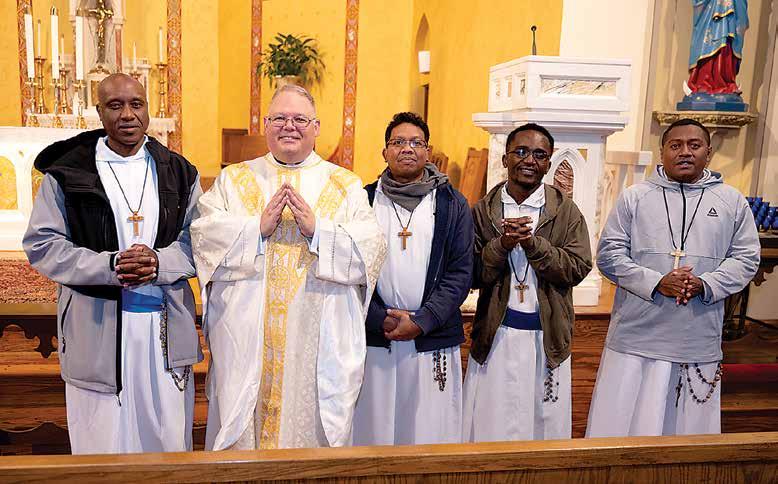
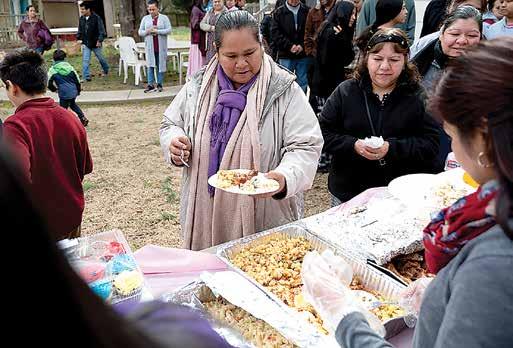
of the crucified and risen Christ, and have helped the poor whom they serve to grow in faith and Christian holiness. An enthusiastic love for Christ our Lord is evident in all the work they do.”
Brother Martin Bukenya, who now oversees the mission, quickly understood that poverty in the United States was very different from poverty in other parts of the world.
“In other countries, poverty is everywhere and we have houses where we can bring people, and take care of the poor. Here in the United States, because of the laws and permit issues, we can’t house
them ourselves,” Brother Martin said. “But over the years I’ve learned that the ‘poverty’ in this country is most sharply expressed in the spiritual life. And that is the focus of our work.”
The brothers host weekly Bible studies and Eucharistic Adoration, and arrange for priests to celebrate Mass at their chapel on Mondays. They also join with the community to pray the Rosary, and distribute food for the poor, making home deliveries of essential goods for those who can’t get out.
They welcome visitors to their mission, inviting the community to help bake goods and harvest fresh food for those in need. The brothers eat what’s left from their
giveaways. They also visit nursing homes and hospitals, and make weekly home visits to parishioners.
Our Lady of Lourdes parishioner Adelaida García is joyful for finding a deep friendship with the brothers and the whole community.
“It gives us a lot of peace to be here,” she said. “They make us feel very happy and welcome to share as one community in prayer and service.”
Rosa Colín, who has been attending the mission for nine years, said she feels like part of a family.
“They’re always there for us. When my husband had severe health problems, they came to our house almost daily to check on him and minister to him,” Colín said. “It was very beautiful for us because, as immigrants, we don’t have any family close to us here. The brothers have become our family.”
The work of the Missionaries of the Poor is possible because the help of volunteers and supporters from across the diocese. To volunteer or make a donation, visit their website at www. missionariesofthepoor.org or call Brother Martin Bukenya at 704-320-7414.
MOUNT HOLLY — The 90-acre campus of St. Joseph College Seminary is quickly becoming the center of an artistic renaissance. With its revival of classic language, learning, music and devotional practices underway, the fine arts were a natural addition to the seminary’s milieu. Its latest work is a polyptych: a 12-foottall, five-panel piece by Italian artist Chiara Perinetti Casoni, who uses egg tempera (paint made of egg yolk and color pigments) painted on gold leaf, a style that flourished in Siena, Italy, between the 13th and 15th centuries.
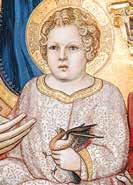
“The first time I saw the beautiful painting on gold, I was captured,” says Casoni, who studied old Latin texts to revive this Sienese artistic tradition. The piece will be prominently displayed in the seminary’s new chapel, which is set to break ground this spring. It will be placed behind the sanctuary in the Lady Chapel, which will house the Blessed Sacrament and will be visible from the nave.
Once commonly used as altarpieces, especially during the early Renaissance period, the polyptych is considered a rare work of art today.
“Frankly, there is nothing of this scale and grandeur that has been done anywhere in centuries. It is, for our age, one of a kind,” says Father Matthew Kauth, rector of the college seminary.
The piece holds special significance to the college seminary and its rector, who was inspired by this form of art while living in Siena in 2008 and returning there during school breaks. He says the style is unique to the city and lends itself well to contemplation.
Paintings of St. Joseph, St. Mary Magdalene, the Blessed Virgin Mary with the Christ Child, St. Catherine of Siena, and St. John the Baptist grace the piece’s wooden panels.
“Our Lady is depicted ‘in trono’ as the
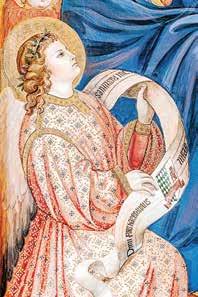
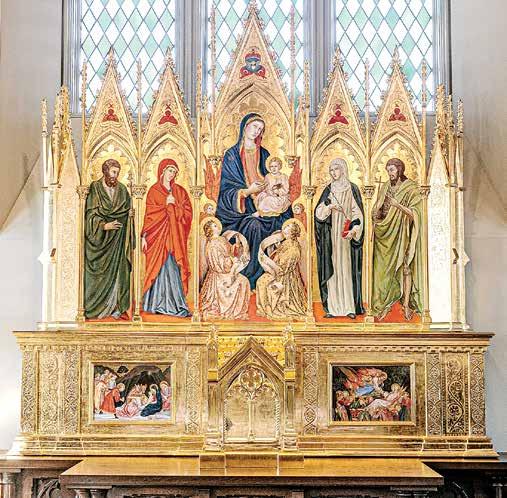
throne of Christ, wisdom incarnate,” Father Kauth explains. “This is the central image of the Sienese polyptych.”
The other saints included on the piece are relevant to the mission of a priest and his formation: St. John the Baptist is a friend of the bridegroom. Mary Magdalen and St. Catherine of Siena are images of the Church for whom these seminarians will one day care for, each having a significant role in preaching the Gospel. And finally, St. Joseph is represented as the seminary’s patron.
Depicted below the saints are scenes of the Epiphany and the Assumption of the Blessed Virgin Mary, two events bookending the earthly lives of Mary and her Son.

After Father Kauth returned to the United States from Italy, he eventually met Mary Clark, who was interested in becoming a sacred artist. He encouraged her to learn the Sienese style of egg tempera and began searching for someone in Siena who still engaged in the art form to teach her.
“That search led me to a small bottega where siblings Chiara, Michelangelo and Paolo continued the tradition. They were not Sienese themselves but came there to learn, perfect, and carry on this tradition,” he says. “Once I saw what they could accomplish in their small paintings, the idea of a polyptych began to materialize. By their nature, polyptychs direct the gaze and
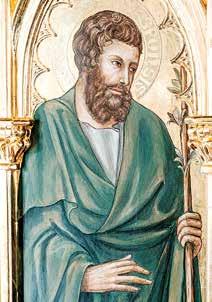
devotion of the visitor.”
This masterpiece took over five years to complete, with several artists and artisans involved.
“The symbolism of the piece developed over time, as did the size and content,” Father Kauth says. “It grew as our understanding of what we wanted to communicate grew. One example is the Christological finch, which the Child Jesus embraces as a sign of His future passion.”
The polyptych was made possible through donations by a few dedicated friends of the seminary. Right now, it is displayed in the sanctuary of the seminary’s current chapel.
Father Kauth emphasizes that although the piece has special meaning to the seminary, it is a gift to all Catholics in the area.
“I would encourage anyone in our diocese to come and spend some time in prayer before the polyptych, for while it enriches our daily life of prayer, it is also meant to enrich the lives of all our faithful,” he says. “Come and make a pilgrimage to see it!”
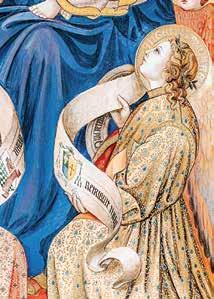
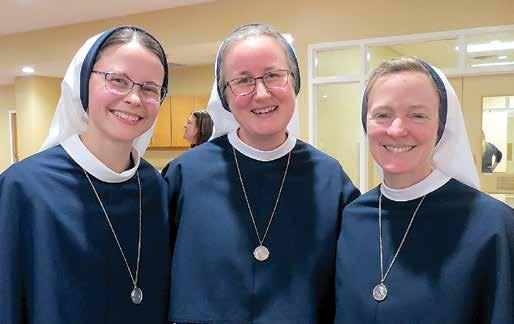
CHARLOTTE — The Diocese of Charlotte received a special visit from the Sisters of Life on Feb. 15 as they spread their messages of joy and love during visits to Belmont Abbey College, St. Thomas Aquinas Parish and St. Peter Parish in Greenville, N.C., as part of a series of speaking engagements in North Carolina on the sanctity of life.
The sisters’ visit was providential. In the month of February, the office of Student Life at Belmont Abbey has a particular focus on fostering healthy relationships, said Wesley Nelson, director of campus ministry at Belmont Abbey College.
“The sisters presented on the gift of every human person, which is fundamental to healthy relationships and fits perfectly with the theme this month,” Nelson said.
The sisters’ spoke with students, faculty and other visitors at the college, challenging them to open up to God’s love.
“What if this Lent, we let Jesus lighten the load,” said Sister Catherine Joy Marie. “Jesus’s love is indomitable. Nothing is too big for Jesus.”
During her talk, Sister Catherine shared three truths to help students as they began their Lenten journey.
“God loves us so much that He goes ahead of us and has our best interest in life,” she said. “You are so precious to God that before He made you, He made someone to protect you, a spiritual friend, form fitted to your unique hearts. God entrusts us to our guardian angels. His entire mission is you.” Lent might seem like a funny time to be reflecting on our goodness, but it’s actually essential to living Lent well, she noted.
“When God says you are above good, He is not just describing you. God’s words are performative; they are actually bringing about who He is in you,” explained Sister Catherine. “You are good, not because you do good. You are good because God is our origin and our destiny.”
Sister Catherine shared a story of accompanying a young mother to her first ultrasound. She was abortion vulnerable and had so much fear, she said.
“When the flickering ultrasound appeared, all you could see was a tiny beating heart,” Sister Catherine said. “‘Look, your little one is all heart,’ exclaimed someone in the room. Now, that’s life! God comes to take residence in our hearts. He imprints His image and His likeness on our hearts. There’s nothing too big or too small for Jesus.”
The sisters and Belmont Abbey students ended the evening in Eucharistic Adoration at St. Joseph’s Adoration chapel with music and meditation.
FOUNDED ON JOY
The mission of the Sisters of Life is truly all about life. Founded in 1992 by Cardinal John O’Connor, the sisters are dedicated to protecting and nurturing life through their outreach of serving pregnant mothers throughout the United States and Canada, bringing God’s joy and goodness to everyone they encounter and serve.
“We are made for love, we are made to love, we are made from love,” said Sister Joseph Mary Nazareth, who presented on the gift of spiritual maternity at St. Peter’s Parish in Greenville.
“You each have love to give that only you can give,” she said. “The gift of spiritual maternity teaches us to delight in the other, God delights in us, and love is the only adequate response to the human person.”
It is just this concept that drives the spirit of the sisters’ work.
“When we accompany women, we first receive her and spend time with her. When she is affirmed, she feels she is loved and appreciated and can do anything,” Sister Joseph Mary said. “If I begin with the doing, she is an object of my charity. But let the nurturing of my heart to receive her then be matched by actions. She needs to believe she has the internal strength to SISTERS, SEE PAGE 18


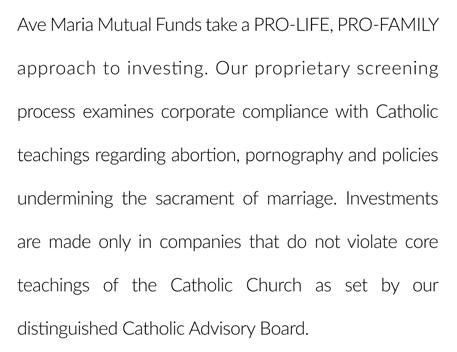

GREENSBORO — Volunteers packed 25,000 meals for the hungry at St. Paul the Apostle Parish in Greensboro Feb. 17. More than 100 parishioners of all ages showed up for the day of service – part of the parish’s ongoing 50th anniversary celebrations and outreach efforts.
Known in the community for serving those in need, the parish partnered with Rise Against Hunger, an international hunger relief organization working to bring food to the hungry in the furthest reaches of the 37 countries it serves.
Because of the event’s success, the parish plans to repeat the effort.
“It was amazing to see our parishioners aged 1 to 92 come out on the first Saturday
of Lent for a day of service to celebrate this milestone anniversary of our parish,” said Amy Marmion, outreach coordinator at St. Paul the Apostle Parish. “It brought awareness to our parishioners of the food insecurities that exist around the world and was a wonderful community-building event for our parish.”
Upcoming 50th anniversary events include a parish picnic June 2, a special anniversary Mass and luncheon July 14, and a memorial Mass for deceased members of the parish Nov. 2. For more information, visit www.stpaulcc.org.
— Annie Ferguson
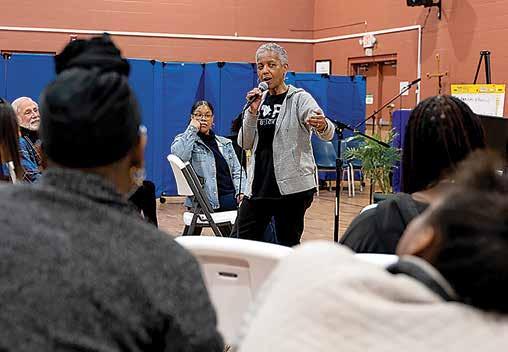
A conversation across generations OLC parishioners share their perspectives on race, faith and the Black Catholic experience
CHARLOTTE — Parishioners young and old gathered Feb. 24 at Our Lady of Consolation Church for candid discussions about race and faith, and about how each generation can help one another learn and grow.
The program, “A Black History Conversation Across Generations,” was the first in a series of discussions being organized by the parish’s Black Culture Commission.
The day focused on sharing stories, experiences and feelings about the history of Black people from the Jim Crow era and the Civil Rights Movement to today – all designed to help build an understanding of how the past affects the present, as well
as ways young people can help older adults understand their feelings about historic and current issues of intolerance and injustice.
Younger attendees heard older adults describe their struggles of the past, particularly during the Civil Rights Movement, and their experiences living the faith today as Black Catholics.
Discussions also explored how people of all ages could strengthen their Catholic faith in everyday life, and how the older generation can inspire young people to remain strong in their faith.
— Troy Hull
Do you feel alone? Are you frustrated or angry with each other? Do you argue or have you just stopped talking to each other? Does talking about it only make it worse?
Retr ouvaille (pronounced “retro-vi”) has helped tens of thousands of couples at ALL stages of disillusionment or misery in their marriage.
T his program can help you, too, or a hur ting couple you might know
Call: Bill & Lyn Folsom, 727-343-6701
Visit: www.HelpOurMarriage.org
Email: 3062ac@helpourmarriage.org
CHARLOTTE — Hundreds of men from around North Carolina – and a few from out of state – renewed their commitment to their faith at the 14th annual Catholic Men’s Conference of the Carolinas, last month at St. Thomas Aquinas Church in Charlotte.
The conference featured a wide variety of speakers and, for the first time, a visit from Bishop Rafael Zarama of the Diocese of Raleigh, who celebrated Mass and presented a homily focused on the need for love in the practice of the Catholic faith.
Bishop Zarama encouraged the men to participate in the liturgy and receive the Eucharist with joy “and not be like those lining up for a funeral.”
and their responsibilities as Catholic men to promote the faith’s values at home, in church, in the workplace, and in the public sphere.
“The inactivity of good, solid Catholic men over the past several years has been evident from the ground up,” Murphy said. “There are many men who have kind of ‘checked out’ and sat on the sidelines, and it has affected the family, the Church and our society. It’s time for more men, especially young ones, to re-engage in their faith and start becoming leaders for their families, the Church and the world around them.”
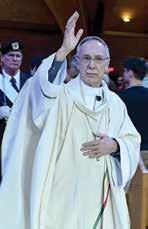
“We must let our love and joy be seen by those who do not know Christ or who have fallen asleep, and let them know we have something more than the world can give,” Bishop Zarama said in his homily.
Jason Murphy, Grand Knight for Knights of Columbus Council 770 in Charlotte, is one of the main organizers for the conference. He said the gathering’s main goal is to help men focus on both their faith
The conference drew men from around the Diocese of Charlotte as well as other parts of North Carolina, South Carolina and even visitors from Ohio.
Speakers included author, radio host and speaker Jesse Romero, who described the duties of Catholic men, and Daniel Vu, a former Marine who talked about his faith journey and struggles, and how God inspired him to lead men to Christ. Master of ceremonies was broadcaster Joseph Enders.
The conference also featured something a little different: a performance by Kentuckybased Catholic musician and rap artist E-Knock, who performed his songs “Real

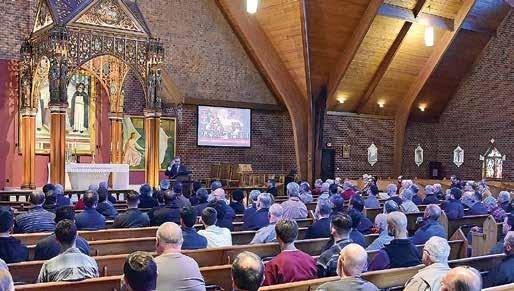
Men,” “Martyr’s Walk” and “I Would Die For This.”
Murphy said outreach to younger Catholic men, especially those in their 20s and 30s, was one of the big focuses of this year’s conference. He was pleased by the increased turnout from that demographic
and said adding E-Knock to the bill was a further effort to appeal to the tastes of a younger audience.
“E-Knock was involved with young adult ministries for a long time and then had
CONFERENCE, SEE PAGE 18

CHARLOTTE — Thousands of people from across the Diocese of Charlotte stood in long lines outside St. Ann Church in Charlotte on Thursday, Feb. 15 to venerate a relic of St. Jude Thaddeus, one of the most beloved saints known as an intercessor for lost causes and desperate situations.
By late that night 3,200 people had turned out, according to Father Timothy Reid, pastor at St. Ann. A special evening Mass was standing room only, and so many people wanted to see the relic that viewing hours were extended to 11 p.m.
The faithful arrived in the parking lot beginning at 9 a.m., long before the relic went on display just after noon. Nearly 350 students from the parish school got the first glimpse of the relic, two large pieces of the saint’s forearm enclosed in a wood reliquary. A line of visitors wound from St. Ann’s Allen Center, outside into a courtyard, and then into the church.
It’s the first time the major relic has traveled outside of its home in Italy, with Charlotte one of three North Carolina stops on the “Apostle of the Impossible” U.S. tour, organized by Treasures of the Church evangelization ministry.
“We see crowds like this every day that we have this relic on display,” said Father Carlos Martins, who leads the ministry and has more than 30 years’ experience as a Church-appointed curator of relics. He celebrated the evening Mass dedicated to the saint.
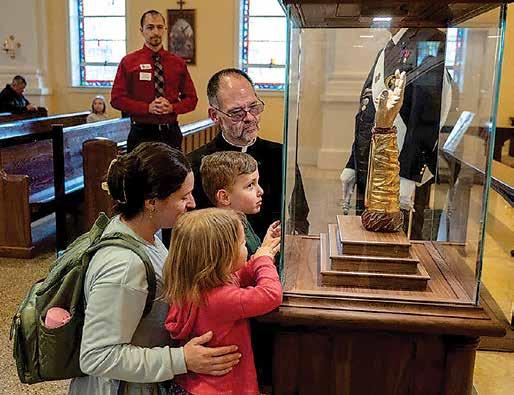
believed to have been martyred around 65 A.D.
Father Timothy Reid, pastor at St. Ann, said it was a special honor to have such a significant relic on display at St. Ann, because St. Jude offers comfort to people dealing with difficult situations, from illness and affliction to financial and employment difficulties. He also feels a special devotion to St. Jude.
“I made my first novena to St. Jude 26 or 27 years ago and my prayers at that time were answered,” Father Reid said. “It’s very special to have this relic here because he can offer consolation and hope to so many people. I’m seeing people of all ages and ethnicities here, and from all across the diocese. When I learned the relic was coming here, I left it in the Lord’s hands to bring the people here that were supposed to be here today. My hope is that if St. Jude isn’t able to completely help some of the people here, he will be able to give them grace to bear their crosses.”
Once inside the church, the faithful had a few minutes to kneel before the reliquary to pray. Many touched and pressed sacred objects such as rosaries, scapulars, medals and crucifixes to the glass.
Tim Hill traveled from Fort Mill, South Carolina, to view the relic with his son Joey Hill, 11. Hill said they talked about the saint’s history on the trip to Charlotte and he did his best to answer his son’s questions.
St. Jude Thaddeus was one of the 12 apostles, and according to history, he and his fellow apostle Simon the Zealot
preached in Mesopotamia, which includes present-day Iraq and parts of Iran, Kuwait, Syria and Turkey. Both apostles are
“I feel a lot of gratitude for being able to experience this major relic and for the chance to expose my son to this tangible evidence of our faith,” he said.


CAbundant amenities and a unique way of life
e Pennybyrn lifestyle is packed with amenities. Living here, you’ll swim laps in a stunning, indoor heated saltwater pool, stay t in a well-equipped facility and power walk, bike or stroll along scenic walking trails. Even membership at Jamestown Park Golf Course is included!
ere’s also the Pennybyrn di erence… and this is what truly sets us apart. You’ll nd a lovely Peace Chapel, a not-for-pro t mission to serve all faiths,
a smaller population for personalized service and inclusiveness that means your voice will always be heard.
A thoughtfully designed home
Your private residence at Pennybyrn—chosen from among a variety of oor plans and prices— will feature a bright, open design with plenty of natural light, a well equipped, modern kitchen, washer and dryer, high ceilings and a private porch, balcony or patio.
CHARLOTTE — Stephen and Jessica Dey are giving back to Catholic Schools in gratitude for the extraordinary support they say the Diocese of Charlotte’s schools have provided their daughter Avery – who was born with Down Syndrome and now is a junior at Charlotte Catholic High School.
Parishioners at St. Matthew, the couple recently donated $1,000 through their Inclusion Rocks Foundation to Our Lady of the Assumption’s PACE program, just one of many inclusion programs the diocese’s Catholic Schools offer special needs students from early childhood through high school.
PACE stands for “Providing Academically Appropriate Catholic Education,” a name that reflects the mission of all of the diocese’s special needs programs. Dey said it is “impossible to describe” all the ways these programs have benefited his daughter.
“The inclusion program has helped her develop social and people skills which will be critically important as she moves into a job-life after school,” he said. “She also just loves school, and life at school has helped her develop life skills like navigating directions and time management, and at the math level she is learning important things like how to deal with finances.”
The Deys established Inclusion Rocks to help schools implement inclusion programs, initially as a private foundation then last year obtaining tax-exempt status. The Charlottebased foundation provides resources for special needs students in Catholic and nonCatholic schools, and to support educators and administrators who work with these students. The foundation’s work includes securing grants from other organizations to support special needs education.
“Gestures like the gift from Inclusion Rocks support our core belief that every child, as a unique creation of God, deserves our best effort to help them achieve successful and joyful lives,” said Catholic Schools Superintendent Greg Monroe. “We can only do this in partnership with parents, parishioners and the community.”
Having come through inclusion
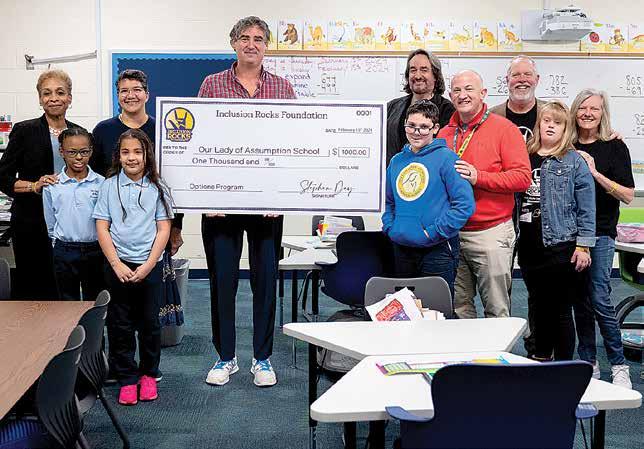
programs at St. Patrick School and Holy Trinity Middle School, Avery now participates in the Options program at Charlotte Catholic, which provides a pathway for special learners from elementary through high school and into college.
The Deys initially sought out Catholic schools because they said public schools didn’t have programs that met Avery’s specific needs.
Our Lady of the Assumption School’s PACE program is designed for elementary and middle school students. From grades 2-5, students spend time in self-contained settings with daily opportunities to attend classes alongside general education students.
The school also offers the Modified
Please pray for the following priests who died during the month of March:

Rev. Robert A. Gibson – 1987
Rev. Francis Gorham – 1981
Rev. John Huston – 1976
Rev. Joseph P. Tobin, OSB - 1978
Academic Program (MAP), designed for students who require a modified academic curriculum. Like PACE, this hybrid program offers instruction in both selfcontained classrooms and with general education students. Instruction in core subjects is adapted to each student’s ability level.
Occupational and speech language therapy are also offered on a weekly basis for younger students at Our Lady of the Assumption. Students in these programs can continue education via the Options path at Holy Trinity and Charlotte Catholic.
Dey said the diocese’s inclusion programs are a blessing not only because they benefit special needs students, but also because of the understanding and
social lessons they offer other students as well.
“That’s a facet that is wildly overlooked…,” he said. “Students who interact with their special-needs peers are starting to develop empathy, compassion and other important social skills. It’s a win-win for everybody involved.
“When you see the kids interact with each other through programs like Best Buddies at Charlotte Catholic, or at dances and football games,” he said, “it’s amazing to see what is happening.”
At www.charlottediocese.org/schools : Find schools and learn more about the special learning programs in the Diocese of Charlotte.

Cross Catholic Outreach and its supporters in the U.S. have become a major force for good in Africa, particularly through their efforts to provide safe water in countries where poor families have been relying on insufficient or contaminated sources.
After major successes in Kenya, the ministry is expanding its efforts in Zambia and Malawi, where local Catholic leaders will be implementing water projects as the charity’s in-country partners.
“Safe drinking water is so accessible in the United States that we tend to think everyone enjoys the same benefit — but nothing could be further from the truth. Water is scarce in many developing countries, and even where it can be found it’s often contaminated and is a health risk for those using it,” explained Michele Sagarino, president of Cross Catholic Outreach. “Keep in mind, these families can’t rely on the modern water systems we have. They typically draw their water from a murky pond, a stream used by animals, or a shallow pit they’ve dug by hand near an old riverbed. All of those sources are teeming with bacteria, animal waste and parasites, but they have to use the water they collect there because it’s essential to their survival.”
As with all of its humanitarian efforts, Cross Catholic Outreach will be implementing its water projects in Africa by working through local, trusted Catholic leaders. In this case, its in-country partners will be Malawi’s Dioceses of Karonga and Mzuzu, Zambia’s Diocese of Chipata, and the Daughters of the Redeemer in Zambia’s Diocese of Kabwe.
“Whenever possible we work through Catholic ministries already in place
overseas because that’s the most effective and efficient way to help the poor,” Sagarino said. “It is also the best use of our supporters’ donations. Our donors want as much of their contributions as possible to reach needy families, and by working through the Church and existing ministry staff, we can achieve that goal. More of every donated dollar we receive can directly benefit the poor.”
The approach Cross Catholic Outreach uses to solve water scarcity problems in Africa is also suited to local needs. Rather than install complicated and difficult to maintain modern water systems in poor communities, the ministry relies on a tried-and-true solution to securing safe water. It brings in professionals to drill wells that will include manual pumps.
“Drilling a well has proven to be the best way to provide safe water in an impoverished African village,” Sagarino said. “In fact, in remote places with little or no access to electricity, it’s really the only way to provide families with a reliable and abundant source of safe water. In some cases, we include a solar-powered pump to make drawing water easier, but that can be done at a reasonable cost too. Many of our Catholic donors are eager to fund the installation of a well when they learn just how inexpensive it is and how much of an impact it has on so many lives.”
While installing a clean-water well is a less complicated process than building a more sophisticated water system, there are still very important steps involved.
The project typically begins with commissioning a hydrogeological survey to determine the best location
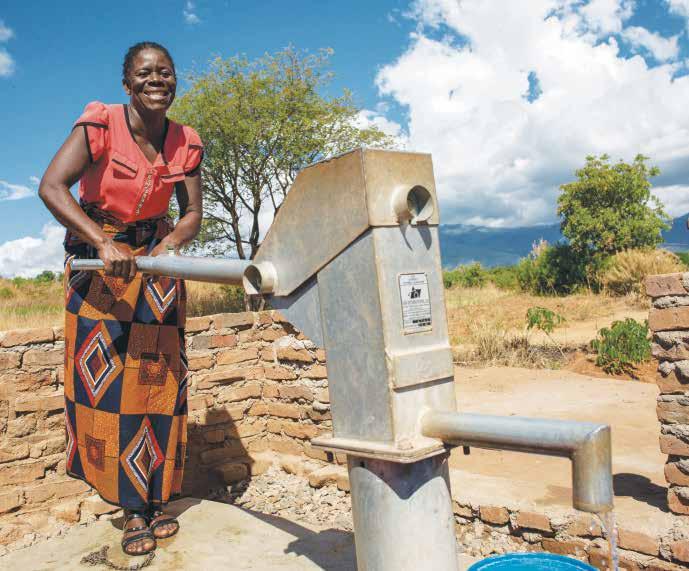

for the well. Once experts have chosen a promising site, a special rig is brought in to drill the well. Since the terrain varies greatly from region to region, determining the depth of the well becomes a critical decision too.
“We’ve had to drill down 200 meters in some cases to ensure we would be able to reach a plentiful source of water,” Sagarino explained.
After the well shaft is encased in a special tubing to preserve its strength and purity, pump tests are run to ensure that there is enough water for the community, and water quality is checked to make sure it is safe for people and animals.
“We have proven the success of this approach in Kenya, where we’ve been able to install 83 wells in recent years — and now we’re excited to bring that same blessed relief to children and families in Zambia and Malawi,” Sagarino said.
“Catholic leaders in the Dioceses of Chipata, Kabwe, Karonga and Mzuzu are ready to get underway. All we need now is funding support from Catholics in the U.S. To secure that help, we’ve been reaching out to individuals, parishes and Catholic schools, and the response so far has been encouraging. I’m confident we’ll reach our goal because this is exactly the kind of mission work Catholics love to support.”
Readers interested in supporting Cross Catholic Outreach’s work for the poor can contribute through the ministry brochure inserted in this issue or send tax-deductible gifts to: Cross Catholic Outreach, Dept. AC03003, PO Box 97168, Washington, DC, 20090-7168. The ministry has a special need for partners willing to make gifts on a monthly basis. Use the inserted brochure to become a Mission Partner.
The long-held tradition of almsgiving during Lent has always been a blessing to Catholic households, but there have been times when families longed for ways to extend their compassion to international communities where the ravages of poverty are often more extreme. We know those needs exist. The challenge is in finding a way to connect U.S. Catholics with families and communities in dire need. This year, the respected relief and development ministry Cross Catholic Outreach has offered a solution — its
Easter Catalog of international mercy projects in need of funding. Through the catalog, individuals, families and parishes can build homes, provide meals to combat malnutrition, sponsor educational scholarships for poor children, address urgent medical needs and undertake many other acts of compassion, all under the supervision of respected Catholic leaders in the countries being served.
The opportunities listed in the catalog truly span the globe, including missions of mercy in the Caribbean, Central and
South America, Africa, and beyond.
“And because the projects listed in the catalog are very specific, those who donate will know exactly how their alms are being used,” explained Michele Sagarino, president of Cross Catholic Outreach. “That creates some wonderful opportunities for parents with young children being taught the importance of almsgiving. Imagine the excitement of your son or daughter knowing their contribution at Lent built a home for a struggling family or ensured a child
would finally be able to attend school. These are not just symbolic charitable efforts. The projects being accomplished are life-transforming.”
This unique Easter Catalog is easy to access. Readers will find a link for it at the ministry’s website (CrossCatholic.org), or they can reach it directly by entering the web address CrossCatholic.org/Easter.
“Lenten almsgiving is always a blessing, but its impact is even more significant when it blesses those with the greatest needs,” Sagarino said.
In Miriam’s village in Zambia, neighbors whisper about a recent lion attack. Dangerous animals are one reason Miriam never stops to rest during her hourlong chore to fetch water. The other is because any delays she experiences in completing her task will make her late for school.
Sadly, the young teen has only made it to second grade, and setbacks of that kind are tragically common for the girls in her village. While the chore of
on the important benefits of an education — a blessing my own children enjoyed.”
According to Sagarino, Catholic leaders in Zambia and Malawi are working with Cross Catholic Outreach to provide solutions. (See related story on the opposite page.)
Father George Banda is one of those eager to see the suffering end. He serves distant and underserved villages within Zambia’s Diocese of Chipata by bringing the Eucharist to the sick and
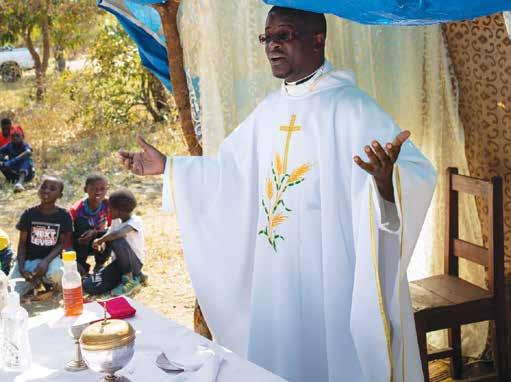
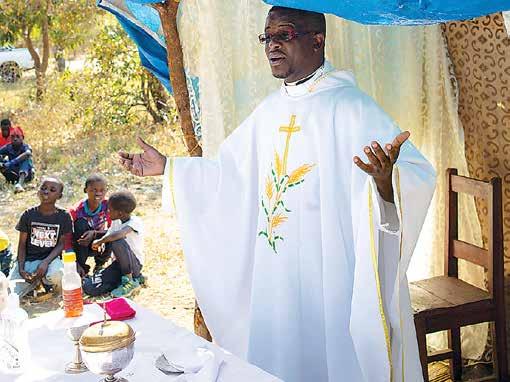
collecting water from a distant source is part of the reason, illnesses are more often to blame. Miriam’s murky water comes from a hand-dug pit contaminated with bacteria.
“When we are sick from the water, we miss school. So it makes it hard for us to achieve our dreams,” Miriam explained. “It gives us little time to do our homework or study. I pray for a good life free from illness.”
When it comes to Africa’s issues with water scarcity, women and girls are among the hardest hit.
“Women and young girls are typically responsible for the time-consuming task of water collection, and they face risks of injury and illness on a daily basis,” confirmed Michele Sagarino, president of Cross Catholic Outreach, a respected Catholic relief and development ministry working to provide solutions to this water crisis. “As a mother of two, it pains me to think these girls are being plagued by illnesses from drinking contaminated water and are missing out
elderly, mentoring Catholic families, and sharing the Word of God. While he is encouraged by the strong faith of those families, he has been troubled by the hardships they must endure.
“It’s a sad situation. There are a lot of people who are sharing water with animals. And some of the water that people are drinking is contaminated,” Fr. George said. “These people are struggling.”
Also partnering with Cross Catholic Outreach to end the suffering in Zambia are Bishop George Cosmas Zumaire Lungu of the Diocese of Chipata and Sister Prisca Matenga of the Daughters of the Redeemer. In Malawi, Cross Catholic Outreach will be working with Bishop Martin Anwel Mtumbuka from the Diocese of Karonga and Bishop John Alphonsus Ryan of the Diocese of Mzuzu.
“With their support, our plan is to bless 49,000 people with a lifetime of clean water and other targeted interventions to serve the poor and strengthen their faith,” Sagarino said.
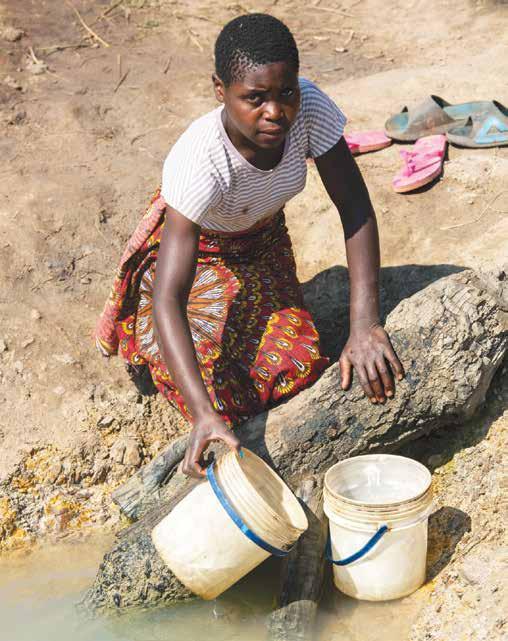
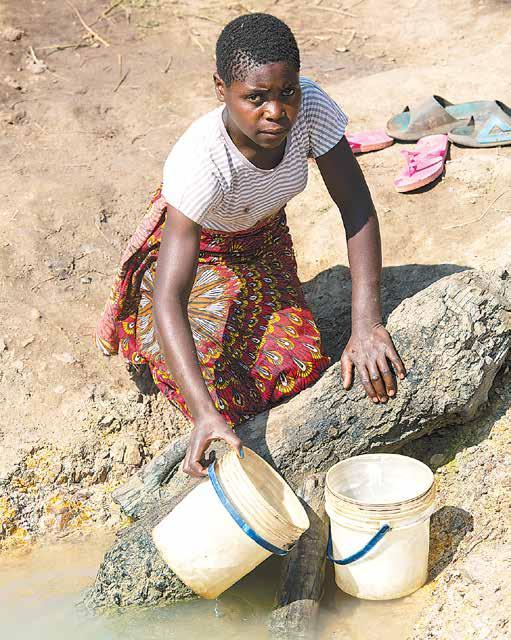
U.S. Catholics
“We call the project Wells of Salvation because its primary objective is to build or repair more than 100 wells to supply safe, clean water.”
For girls like Miriam, this effort will be a literal answer to prayer. It will remove the heavy burden of water collection from her shoulders and ensure her health is no longer at risk.
“Our hope is that U.S. Catholics will want to support this effort with their prayers and financial support,” Sagarino said. “I know if my own child or grandchild was facing the challenges Miriam endures, I wouldn’t hesitate to relieve her suffering. In this case, we can actually transform the lives of Miriam and thousands like her!”
To fund Cross Catholic Outreach’s effort to help the poor worldwide, use the postage-paid brochure inserted in this newspaper, scan the QR code, or mail your gift to Cross Catholic Outreach, Dept. AC03003, PO Box 97168, Washington, DC, 20090-7168. The brochure also includes instructions on becoming a Mission Partner and making a regular monthly donation to this cause.
If you identify an aid project, 100% of the donation will be restricted

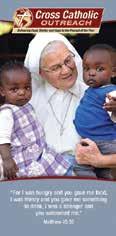
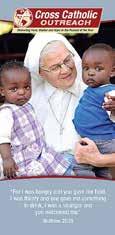


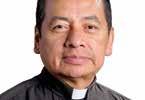
En aquel tiempo, el Espíritu impulsó a Jesús a retirarse al desierto donde permaneció cuarenta días (Mc 1:12). Nuevamente nos encontramos guiados por el Espíritu al desierto cuaresmal, ese mismo desierto que es el lugar de encuentro con Dios y en donde podemos discernir su voluntad para nosotros.
Fue lugar de encuentro para Moisés (Ex 3:1-6); lugar de silencio, solitud y admiración, como le sucedió a Abraham (Gn 15:56); lugar donde te puedes encontrar con fieras salvajes y también donde los ángeles del Señor te acompañan y sirven (Mc 1:13).
Ahora, es tiempo de dejarnos llevar por el Espíritu a ese mismo desierto. Para que esto suceda, nosotros, tú y yo, debemos tomar conciencia de que, como todo viaje, requiere de planeación y preparación.
Entonces, ¿cómo te puedes preparar? Primero, debes desear ir solo, pues Dios desea encontrarse contigo y darte de su tiempo uno a uno. Para eso, debes decidir desapegarte de aquello o aquellos que no te quieren dejar ir. ¿Por qué no te quieren dejar ir? Porque te quieren, no pueden estar sin tí, y piensan que el amor que te ofrecen es suficiente y que con eso deberías conformarte. No piensan así por desearte mal, es simplemente que así pensamos muchas veces. Pero tú sabes, porque lo sientes, que tienes necesidad de alguien que es más que todos los amores y cariños de este mundo juntos. Ese es Dios que desea tener este tiempo contigo a solas.
Vé a un lugar solitario de tu casa, pon frente a tí un crucifijo, o una vela encendida, o una biblia abierta, y ponte de rodillas frente a Él. Haz una pequeña oración: “En tu nombre Señor Jesús, en tu espíritu, y tú y yo con la misma intención, dame la gracia de poder estar contigo con toda mi mente, fuerzas, corazón y alma”.
Respira profundamente, déjate tomar de la mano por tu ángel de la guarda, no tengas miedo, entra en ese desierto y déjate sorprender por aquel que es amor.
Luego, después de haber tenido esta experiencia, descríbela y escríbela. Vé con tu ministro, catequista, o con la monjita de tu comunidad. Comparte. Si están muy ocupados, entonces ve al Santísimo que siempre tiene tiempo para todos, porque para Él eres lo más importante.
Ayuno, limosna, oración, son parte de los ejercicios espirituales de toda Cuaresma. Te invito a ponerlos en práctica de una manera intencional. Resiste la tentación de creer que no son necesarios ni importantes. Para los bobos son bobadas, para nosotros, hombres y mujeres de fe, son gracias de nuestra fe, parte de nuestra vida espiritual. Gloria a Dios, hermanos en Cristo Jesús.
EL DIÁCONO EDUARDO BERNAL es coordinador del Ministerio Hispano del Vicariato de Charlotte.
CÉSAR HURTADO rchurtado@rcdoc.org
CHARLOTTE — José
Gregorio García Rubio, colombiano, nacido en un pueblito llamado Sardinata, a 75 kilómetros de Cúcuta, capital del departamento de Santander, en la región fronteriza con Venezuela, es el nuevo vicario parroquial de la Iglesia Nuestra Señora de Guadalupe en Charlotte.
Proveniente de un hogar profundamente católico, la vocación de sacerdote le viene de familia. “Se tiene que saber que somos doce primos hermanos sacerdotes. ¡Doce! y vienen más en camino, teniendo en cuenta un diácono que ya ha sido ordenado. Creo que son tres hermanas de clausura incluídas. Venimos como de ese mundo, entonces como que no sorprende mucho mi vocación de sacerdote”, nos relató.
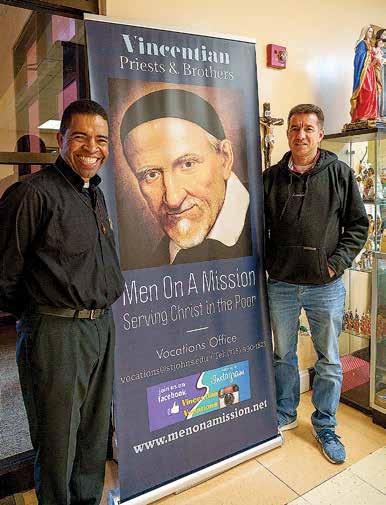
De niño y joven no participó como servidor del altar ni en grupos apostólicos, pero si asistió a la catequesis en una región rural, donde su padre era catequista. Durante una visita del obispo, debido a la larga distancia a la escuela, su papá ofreció un almuerzo a la comitiva en su propia casa. “Ahí fui confirmado, en el patio de mi casa”, nos confesó.
CÉSAR HURTADO | CATHOLIC NEWS HERALD
El saliente vicario parroquial, Padre Blas Lemos (a la izquierda), aparece en la imagen con el P. José Gregorio García Rubio, flamante vicario de la parroquia Nuestra Señora de Guadalupe. Ambos son sacerdotes de la congregación vicentina.
“Y mira que que me ha resultado porque he estado en muchos países”, dijo.
Trabajó en una tienda de abarrotes para ayudar a la economía familiar, lo que lo mantuvo alejado de las tentaciones propias de la edad. “No había tiempo para esparcimiento de ningun tipo, ni siquiera el deporte. Todo era estudio, trabajo, estudio, trabajo. Luego, salí del colegio y fui directamente al seminario. Nunca entré a una discoteca, ni a un bar. No entré a un restaurante sino hasta haberme ordenado de sacerdote”.
VICENTINO ACCIDENTAL
“Lo de vicentino se dio por accidente”, comentó, porque ya habiendo decidido ser sacerdote, inició el proceso con su diócesis local, la diócesis de Cúcuta. “Pero estudiaba en un colegio regentado por hermanas vicentinas y la rectora, que se dio cuenta que estaba en contacto con el seminario diocesano, entonces me propuso que ingrese a los vicentinos”.
Viniendo de una familia de escasos recursos, le entusiasmó la idea de recibir la formación de manera gratuita, “porque en Colombia hay que pagar el seminario”, aclaró, así como también una buena oportunidad para salir y conocer otras partes del mundo.
Inició su formación en Colombia tomando Filosofía y luego fue enviado becado a continuar sus estudios en Francia, donde aprendió el idioma a la perfección y fue ordenado sacerdote el 15 de agosto de 2004.
Desde ese entonces fue asignado a labores de maestro, de instructor de seminaristas, y se ha graduado como master en consejería en Chicago, recibido capacitación en Italia y El Líbano, por lo que también habla italiano, inglés y un poco de árabe.
Ahora, en Estados Unidos, durante sus primeros días, “todavía no he empleado la primera palabra en inglés”, dijo sonriente.
Para el P. García, formador incluso desde el diaconado, esta es su primera experiencia parroquial. “Si me preguntas de una parroquia no sé absolutamente nada. Sé la teoría porque soy formador del seminario, pero no tengo la práctica”. El llamado a Estados Unidos no lo tomó por sorpresa, pero siendo honesto, dijo, pensó que sería enviado a Nueva York.
En Charlotte, sorprendido por la realidad casi rural y grandes distancias para recorrer dentro de la comunidad, espera pronto revalidar su licencia de
conducir y conseguir un coche para que lo asista en sus labores de visitar enfermos, hospitales, casas funerarias o cualquier ministerio fuera de la iglesia.
Después de haber pedido vivir una experiencia apostólica, llegar a la parroquia Nuestra Señora de Guadalupe lo llena de ilusión, pero a la vez lo considera un reto.
“Cuando escucho que tenemos como 1.700 estudiantes en la catequesis, ya casi pego el grito en el cielo porque, bueno, me pregunto, ¿cuándo los vamos a escuchar en confesión?
Respecto a la comunidad, la considera muy querida, abierta y receptiva, con necesidad de espacios para ser escuchada, “con una población muy grande, que consideramos como un territorio de misión”.
Para el Padre García el edificio de la parroquia muestra la periferia. “No es una iglesia como tradicionalmente te la imaginas, con una torre, la nave central. No, aquí te encuentras con un salón parroquial, adecuado a manera de iglesia”, pero que en realidad acoge las múltiples actividades de formación de la fe, de reunión de grupos apostólicos, de actividades teatrales, etc.
FUTURO
El Padre García llega inicialmente para cumplir una temporada de dos años, y de allí los superiores decidirán si se extiende su estadía.
Al pedir una experiencia pastoral, el nuevo vicario buscaba contrastar la enseñaza de los libros con la práctica real. “Siendo formador, cuando enseñamos partimos desde lo que constatamos en los libros y nada más. ¿Qué es lo que yo espero conocer? Quiero saber cuál es la realidad, qué es lo que necesitan las diócesis, qué es lo que está pidiendo la gente, cuáles son las necesidades pastorales. Así, para que cuando yo vaya a formar hombres, yo vaya a decirle a los estudiantes con esto es que lo que tú te vas a encontrar”.
Respecto a su carrera sacerdotal, el carisma vicentino de formación y servicio dijo, no deja espacio ni deseo de una carrera jerárquica.
Con todas sus fortalezas, el Padre García nos muestra una pequeña debilidad. “Soy de muy buena cuchara”, dijo, “como de todo”. “Afortunadamente me he dado como muchas vueltas por el mundo. Decía que en mis tiempos pasados ni siquiera los restaurantes los conocía. Los descubrí, ya de cura, estando sobre todo en Francia, y me volví devoto de los restaurantes, especialmente los de comida de mar”.
CÉSAR
CHARLOTTE — Numerosas promotoras de la Pastoral de Salud del Ministerio Hispano del Vicariato de Charlotte asistieron a una sesión de capacitación sobre autocuidado y estrés que llevo a cabo Fe y Salud Coalición Latina, una organización sin fines de lucro que reune a instituciones de fe y del cuidado de la salud de la región de Charlotte, misma en la que se encuentra afiliada el ministerio hispano del vicariato de la Ciudad Reina.
Las sesiones estuvieron a cargo de Gloria Restrepo y Angélica Hurtado, fundadoras de Balance Life Coaching, y Rita Domínguez, miembro de Fe y Salud y activista de larga trayectoria por la salud integral de la comunidad latina. Restrepo y Hurtado, ambas especialistas certificadas en Life Coaching, abordaron el tema del autocuidado. Durante su exposición, al reconocer el trabajo voluntario de las promotoras y personas involucradas en el servicio a la comunidad, subrayaron la importancia del autoconocimiento y
autocuidado de ellas mismas. “Para estar lista en el conocimiento de otras personas, lo ideal es que primero te conozcas a tí misma. Igualmente, para ayudar en el cuidado de otras personas, es importante, es indispensable, que te cuides primero a tí misma”, aseguraron.
El cuidado, afirmaron, es integral, lo que incluye salud física, mental, espiritual, emocional y social. Restrepo dijo que contar con una buena salud emocional nos beneficia pues, “mejora nuestra productividad, eleva nuestra autoestima, nos ayuda a conocernos para finalmente poder ofrecer un mejor servicio a los demás”.
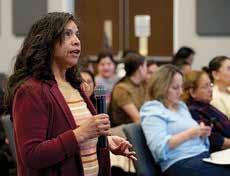
En el aspecto físico resaltaron la necesidad de ejercicio diario, cuidado de alimentación, higiene y prevención de salud. Respecto al cuidado mental, subrayaron la importancia de cuidar lo que pensamos y decimos, “tomando más conciencia de lo que estamos hablando a otros y a nosotros mismos”.
El autocuidado es un acto de amabilidad con uno mismo. “Al cuidarnos, al conocernos y al darnos una mejor calidad de vida
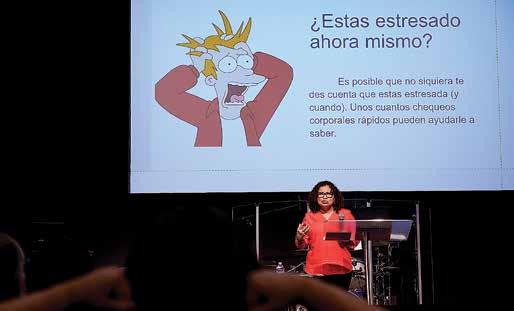
CÉSAR HURTADO | CATHOLIC NEWS HERALD (Izquierda) Eva García, promotora de la pastoral de salud del ministerio hispano del vicariato de Charlotte, realiza preguntas a las expositoras del tema de autocuidado. (Arriba) Rita Domínguez, al exponer el tema de estrés crónico, dijo que este mal afecta la salud física y mental de las personas.
podremos ser capaces de superar cualquier contratiempo que nos presente la vida”, dijo Hurtado.
Rita Domínguez, al tocar el tema del estrés, dijo que el estrés crónico puede impactar en
la salud física, emocional y psicológica.
“Es importante reconocer las señales y cómo el estrés crónico pude afectar la salud
Primera visita pastoral del año se realizó en CharlotteCÉSAR HURTADO rchurtado@rcdoc.org
CHARLOTTE — El Padre Julio Domínguez, vicario apostólico del ministerio hispano de la Diócesis de Charlotte, realizó la primera visita pastoral del año a la Vicaría de Charlotte el pasado miércoles 21 de febrero en las instalaciones del centro pastoral diocesano.
Decenas de líderes de ministerios, movimientos apostólicos, catequistas, miembros de pastorales y voluntarios se presentaron para recibir información sobre nuevos programas y servicios, así como también para expresar sus inquietudes y comentarios.

“Ha sido un encuentro muy provechoso para todas las partes”, dijo la Hermana Juana Pearson, asistente del vicario del ministerio hispano, quien inicialmente realizó una presentación sobre el nuevo website diocesano y su completa sección en español.
La Hermana Pearson navegó por las diferentes páginas, deteniéndose en cada una de ellas y explicando el contenido disponible a detalle. Resaltó el trabajo profesional desplegado y las ventajas de este nuevo website respecto al anterior, mucho más sencillo, amigable y que ofrece respuestas a las necesidades de información de los visitantes.
Posteriormente, el Padre Julio Domínguez hizo hincapié en el programa de formación continua y certificación que ofrece gratuitamente la diócesis. El Padre Domínguez dijo que la diócesis se ha asociado con el Instituto Catequético (IC) de la Universidad Franciscana, “con la
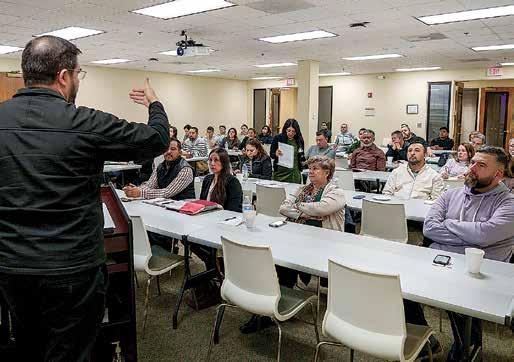
CÉSAR HURTADO | CATHOLIC NEWS HERALD
Arriba: El Padre Julio Domínguez, vicario episcopal del ministerio hispano de la Diócesis de Charlotte, incidió especialmente en la necesidad de una formación contínua del liderazgo hispano a través de los cursos gratuitos que se ofrecen en la Universidad Franciscana. Derecha: La Hermana Juana Pearson, asistente de la oficina del ministerio hispano diocesano, presentó el contenido de las páginas en español del nuevo website de la diócesis.
intención de proporcionar una educación académica continua para nuestros catequistas”, a través de certificaciones, formación permanente y mentorías en temas esenciales de la doctrina católica para la formación de discípulos.
Esta oportunidad, señaló, “se ofrece a todas nuestras parroquias, misiones y escuelas, como un ‘regalo’ por los próximos dos años, desde agosto de 2024 hasta agosto de 2026, gracias a una beca de formación en la fe”.
La formación, precisó, no solo está dirigida a catequistas, sino también a padres, profesores de escuelas católicas, líderes de ministerios y personas que deseen profundizar su conocimiento y comprensión de la fe católica.
Más tarde, el Diácono Eduardo Bernal, coordinador del ministerio hispano del Vicariato de Charlotte, explicó a los presentes los diferentes programas de capacitación que se ofrecen localmente.
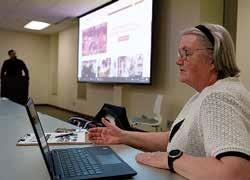
Anunció que próximamente se realizará un taller de autoconocimiento como parte del programa de liderazgo. Asismismo anunció un programa virtual de educación cristiana sobre la sexualidad en el que participarán agentes pastorales certificados por SEPI, un psicólogo y un diácono.
Otros programas dijo, siguen en vigencia, como la Pastoral de Duelo, Planificación Familiar Natural, Pastoral de la Salud, Pastoral Familiar, Pastoral Juvenil de Acompañamiento. A los que se añade una capacitación virtual sobre Espiritualidad Carmelita que llevará a cabo el conocido Padre Juan Evangelista.
De otra parte, la Hermana Pearson dijo que tres personas bilingües de cada vicaría asistirán a la 18 Conferencia Bienal Regional sobre Corresponsabilidad que coordinan las Diócesis de Charlotte, Charleston, Raleigh y la Arquidiócesis de Atlanta.
“Mirando hacia el futuro, será útil contar con equipos de corresponsabilidad a nivel de vicariato preparados para ayudar a las comunidades en su creciente responsabilidad y fiel discipulado sobre los recursos de nuestra diócesis”, dijo la Hermana Pearson.
CÉSAR HURTADO
rchurtado@rcdoc.org
MONROE — Un encuentro casual en un aeropuerto de Nueva York ha traído innumerables bendiciones para los fieles del Condado Union.
El Padre Richard Ho Lung, MOP, de Jamaica, viajó a la gran ciudad en 2008 con la esperanza de establecer una misión en Estados Unidos, pero al no tener éxito, se dirigía de regreso a casa cuando se encontró con el Obispo Peter Jugis.
El Padre Ho Lung se presentó a sí mismo como fundador y superior de los Misioneros de los Pobres, con sede en Jamaica y misiones establecidas en varios países del mundo.
Los dos hombres conversaron, contó el entonces director de la misión en Monroe, Hermano Augusto Silot, en una entrevista realizada en 2013, “y el Obispo Jugis invitó al Padre Ho Lung a visitar Charlotte”.
El momento llevó a la comunidad religiosa a establecer su única misión en Estados Unidos, en el Condado Union, donde el Obispo Jugis una vez sirvió como párroco de la Iglesia Nuestra Señora de Lourdes.
“Los Misioneros de los Pobres son verdaderamente dignos de su nombre”, dijo el Padre Benjamín Roberts, actual párroco de Nuestra Señora de Lourdes. “Hacen un trabajo extraordinario por los pobres y las comunidades inmigrantes y están en comunión con nosotros. Hemos sido bendecidos por la presencia de los hermanos y su comunidad durante muchos años”.
Hoy en día, la misión prospera entre amigos, voluntarios y feligreses, que semana a semana se acercan a los más vulnerables en la comunidad.
Aunque solo cuatro hermanos sirven en la misión, la institución ofrece adoración, oración, catequesis y actividades para la comunidad inmigrante en crecimiento. Regularmente organizan almuerzos comunitarios, entregan despensas y visitan asilos, así como enfermos en hospitales y hogares.
ESTABLECIMIENTO DE UNA MISIÓN
Los Misioneros de los Pobres se sintieron conmovidos por las personas que conocieron y la necesidad que vieron en el Condado Union. Después de conversar y explorar el territorio, el Obispo Jugis invitó
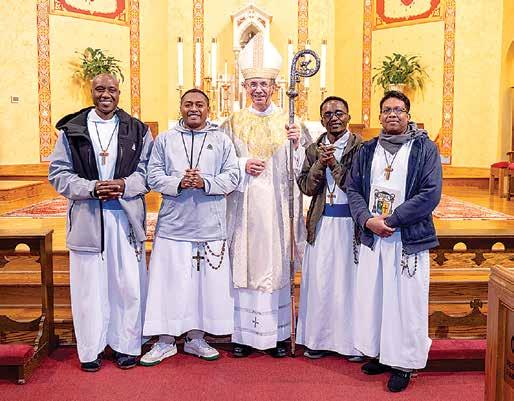
En su décimoquinto año de servicio en Monroe, los Misioneros de los Pobres han cultivado una comunidad de servicio gozoso. En la imagen, aparecen los hermanos con el Obispo Peter Jugis en la Misa anual por la Vida Consagrada realizada en la Catedral San Patricio en enero pasado.
a los misioneros a establecerse en Monroe y comenzar su trabajo.
La feligresa de Nuestra Señora de Lourdes, Rosa Elba Gutiérrez, recordó los primeros días después de la llegada de los hermanos en 2009.
“Vinieron a la parroquia... y nuestro párroco en ese momento, el Padre James Cassidy, les permitió quedarse en la rectoría de la parroquia todo el tiempo que necesitaran”, recordó Gutiérrez. “Los llevaba en mi carrito por las calles de Monroe, buscando un pedazo de tierra o una casa para su misión”.
Gracias a generosos donantes, solo seis meses después, los misioneros pudieron encontrar una casa y un terreno en la calle Griffith en Monroe.
Como parte de su ministerio, los misioneros repararon la casa y
transformaron el terreno lleno de árboles en un vasto jardín donde ahora cultivan vegetales y crían gallinas ponedoras. También construyeron una capilla en la propiedad para celebrar Misa y orar, sirviendo a la creciente comunidad hispana.
“Tenemos la bendición de tener a los Misioneros de los Pobres en nuestra diócesis, brindando un servicio gozoso a los pobres por amor a Cristo”, dijo el obispo Jugis. “Desde que se abrió su misión en Monroe, han dado un testimonio eficaz como religiosos comprometidos a la misericordia de Cristo crucificado y resucitado, y han ayudado a los pobres a quienes sirven a crecer en la fe y la santidad cristiana. Un amor entusiasta a Cristo nuestro Señor se evidencia en todo el trabajo que realizan”.
POBREZA ESPIRITUAL
El Hermano Martin Bukenya, MOP, que ahora conduce la misión, explicó que la pobreza en los Estados Unidos era muy diferente de la pobreza en otras partes del mundo.
“En otros países, la pobreza está en todas partes y tenemos casas donde podemos cuidar de los pobres. Aquí, en los Estados Unidos, debido a las leyes y a los problemas con los permisos, no podemos alojarlos nosotros mismos”, dijo el Hermano Martin. “Pero a lo largo de los años he aprendido que la ‘pobreza’ en este país se expresa más profundamente en la vida espiritual. Y ese es el enfoque de nuestro trabajo”.
Los misioneros ofrecen su capilla a sacerdotes visitantes que celebran Misa los lunes, y organizan estudios bíblicos semanales y Adoración Eucarística. También se unen a la comunidad para rezar el Rosario y distribuyen alimentos para los pobres.
Dan la bienvenida a los visitantes a su misión. Los hermanos, en el límite de la austeridad, comen lo que queda de sus donaciones. También visitan hogares de ancianos, hospitales, y hacen visitas a los hogares de los feligreses.
SON NUESTRA FAMILIA
Rosa Colín, quien asiste a la misión desde hace nueve años, dijo que se siente parte de una familia.
“Siempre están ahí para nosotros. Cuando mi esposo tuvo problemas de salud, llegaron a nuestra casa para ver cómo se encontraba”, dijo Colín. “Fue muy bonito para nosotros porque, como inmigrantes, no tenemos ninguna familia cercana. Ellos son nuestra familia”.
El trabajo de los Misioneros de los Pobres no sería posible sin la ayuda de voluntarios. Si está interesado en ser voluntario o hacer una donación, visite a los Misioneros de los Pobres en 1403 Griffith Road, Monroe, visite en www. missionariesofthepoor.org o envíe un mensaje de texto al Hermano Martin Bukenya, MOP, al (704) 320-7414.
CÉSAR HURTADO rchurtado@rcdoc.org
ASHEBORO — Con la intención de llevar a cabo las tradicionales representaciones de la Última Cena de Jueves Santo, y La Pasión de Cristo de Viernes Santo, integrantes de los grupos teatrales de la parroquia San José en Asheboro iniciaron sus ensayos y labores de preparación de decorado, vestuario y facilidades desde mediados de febrero.
Así lo confirmó Martha Tinoco, directora del grupo juvenil y de la representación de la Última Cena de Jueves Santo. “Todos los participantes, tanto de la representación de la Última Cena como del Vía Crucis, ya hemos iniciado los ensayos después de un proceso de selección de actores nuevos y otros con experiencia”, señaló.
Respecto al libreto de las representaciones, dijo que fue trabajado por ellos mismos pero basado en los Evangelios. “No encontramos una obra ya escrita, por lo que nos dimos a la tarea de investigar y extraer la información de los Evangelios de Marcos, Lucas y Juan. Luego, un poco usando la imaginación, recreamos los diálogos para las diferentes escenas”.
Tinoco dijo que, al menos, en la representación de la Última Cena, ingresan a escena alrededor de treinta artistas, sin contar con el personal de producción y apoyo. Respecto al vestuario, cada uno de los actores se encarga de proveer su propio vestuario. “En la iglesia contamos con la ayuda de una hermana que nos apoya con la confección de los mismos”. La directora, a cargo de la obra por
segundo año consecutivo, dijo que la tarea no le resulta difícil. “Trabajar con jóvenes no es fácil porque a veces algunos se distraen. Pero, a cambio, la satisfacción es grande. Nada, creo, es difícil cuando te gusta hacer las cosas. Simplemente, a veces, como humanos, nos cuesta hacer las cosas. Nervios, felicidad y gusto es lo que me trae este trabajo”, añadió.
Personalmente, dijo, la preparación de la obra durante el tiempo de Cuaresma, la toma como algo personal. “Lo siento como si yo estuviera allí también, viviendo lo que Jesús también vivió. Me motiva a buscar un cambio en mi vida y en mí misma si fuera necesario”.
Ambas obras se representarán en un parque ubicado al frente de la Iglesia San José. “Después de la celebración de la Misa, usualmente invitamos a la gente a que
se acerque a ver la representación”, dijo Tinoco. Incluso, aseveró que en casos de lluvia o mal tiempo, como sucedió el año pasado, se han visto obligados a cancelar la obra pues, “somos conscientes que debemos respetar el interior del templo”.
“El año pasado nos sentimos tristes por la preparación a la que habíamos llegado. Fue frustrante. Pero siempre hemos sido concientes y le decimos al equipo que no trabajamos para vanagloriarnos, ni para quedar bien con la gente, ni para llamar la atención. Nuestro trabajo es por devoción a Jesús, por amor a Cristo”.
En caso de no llevarse a cabo, asegura, lo toman como voluntad de Dios. “Lo importante es lo que nosotros nos llevamos en nuestros corazones, la transformacion que esta tarea realiza en nuestras propias almas”, puntualizó.
El 3 de marzo, la Iglesia celebra la fiesta de Catalina Drexel, una nativa de Filadelfia que abandonó la fortuna de su familia para fundar una orden de hermanas dedicadas a servir a las empobrecidas poblaciones afroamericanas y nativas americanas de los Estados Unidos.
Santa Catalina Drexel nació el 26 de noviembre de 1858 en la acomodada familia Drexel de Filadelfia. A pesar de su riqueza, la familia era muy piadosa y le enseñaron la caridad desde una edad temprana. Su madre abría la casa familiar tres veces por semana para alimentar y cuidar a los pobres, y su padre tenía una profunda vida de oración personal.
Durante los meses de verano, Katharine y sus hermanas impartían clases de catecismo a los hijos de los trabajadores de la finca de verano de su familia.
La joven heredera se planteaba la vocación a la vida contemplativa cuando se le presentó la oportunidad de viajar a Europa y tener una audiencia con el Papa. Durante la audiencia, pidió al Papa León XIII que enviara misioneros a Wyoming. Él respondió preguntándole el por qué no fundó una orden para hacer exactamente eso.
A su regreso a casa, Catalina comenzó a trabajar como laica para mejorar las condiciones y la educación de los afroamericanos y los nativos americanos. Con el tiempo, su trabajo la llevó a fundar las Hermanas del Santísimo Sacramento, que se dedican a compartir el mensaje del Evangelio y la vida Eucarística con los afroamericanos y nativos americanos.
Durante su vida, supervisó la apertura y el mantenimiento de casi 60 escuelas y misiones, la mayoría de las cuales estaban ubicadas en el oeste y suroeste de los Estados Unidos.
Desde los 33 años hasta su muerte en 1955, dedicó su vida y una fortuna de 20 millones de dólares a este trabajo. En 1894, participó en la apertura de la primera escuela misionera para nativos americanos en Santa Fe, Nuevo México. Rápidamente siguieron otras escuelas, para nativos americanos al oeste del río Mississippi y para afroamericanos en el sur. En 1915
MARZO 3-9
Domingo (Tercer domingo de Cuaresma): Éxodo 17:3-7, Romanos 5:1-2, 5-8, Juan 4:542; Lunes: 2 Reyes 5:1-15, Lucas 4:24-30; Martes: Deuteronomio 3:25, 34-43, Mateo 18:21-35; Miércoles: Deuteronomio 4:1, 5-9, Mateo 5:17-19; Jueves (Santas Perpetua y Felícitas, mártires): Jeremías 7:23-28, Lucas 11:14-23; Viernes: Oseas 14:2-10, Marcos 12:2834; Sábado (Memoria de Santa Francesca Romana, religiosa): Oseas 6:1-6, Lucas 18:9-14
MARZO 10-16
Domingo (Cuarto domingo de Cuaresma): 2 Crónicas 36:14-16, 19-23, Efesios 2:4-10, Juan 3:14-21; Lunes: Isaías 65:17-21, Juan 4:43-54; Martes: Ezequiel 47:1-9, 12, Juan 5:1-16; Miércoles: Isaías 49:8-15, Juan 5:17-30; Jueves: Éxodo 32:7-14, Juan 5:31-47; Viernes: Sabiduría 2:1, 12-22, Juan 7:1-2, 10, 25-30; Sábado: Jeremías 11:18-20, Juan 7:40-53
también fundó la Universidad Xavier en Nueva Orleans.
Al momento de su muerte había más de 500 hermanas enseñando en 63 escuelas de todo el país.
Se vio obligada a jubilarse durante los últimos 20 años de su vida después de haber quedado debilitada por un grave ataque cardíaco. Aunque no pudo liderar activamente la orden, dejó a las hermanas su carisma de amor y preocupación por las misiones.
Murió el 3 de marzo de 1955 y fue canonizada por el Papa Juan Pablo II el 1 de octubre de 2000.
Santa Catalina Drexel jugó un papel fundamental en la creación de la Abadía de Belmont.
En 1892, el Abad Leo Haid, fundador de la Basílica María Auxiliadora, más conocida como Abadía de Belmont, se propuso construir una catedral. Sin embargo, en el verano de 1893 el proyecto se quedó sin fondos. Con la ayuda del Padre Francis Meyer, entonces párroco de la Iglesia San Pedro en Charlotte, el Abad Haid pudo conseguir un donante. Esa donante fue la Madre Catalina Drexel, y su donación a Belmont Abbey vino con una condición: la nueva iglesia tenía que tener una cantidad adecuada de bancos para uso exclusivo de los afroamericanos.
El Abad Leo Haid también reconoció la importancia de acabar con “los desagradables prejuicios contra las personas de color”.
Entonces, le escribió a la Madre Drexel y le dijo que no veía “ninguna razón por la cual no debería aceptar con gratitud su generosa oferta”. En 1904, cuando visitó la Abadía de Belmont, encontró una hilera completa de bancos a lo largo de la iglesia exclusivamente dedicada a afroamericanos.
Los bancos se utilizan hoy en la iglesia y se conservarán mientras la Iglesia de San Pedro se renueve el próximo año.
A finales de la década de 1890, Santa Catalina también donó fondos para construir la Iglesia San Benito en Greensboro, nuevamente con la condición que se reservaran varios bancos para los afroamericanos. En el lado izquierdo del santuario, hoy se encuentra una hermosa estatua de Santa Catalina Drexel, en honor a su ayuda a la parroquia y su vida de servicio a los demás.
— Catholic News Herald
MARZO 17-23
Domingo (Quinto domingo de Cuaresma): Ezequiel 37:12-14, 1 Romanos 8:8-11, Juan 11:1-45; Lunes (Memoria Opcional de San Cirilo de Jerusalén, obispo y doctor de la Iglesia): Deuteronomio 13:1-9, 15-17, 19-30, 33-62, Juan 8:1-11; Martes (Solemnidad de San José, esposo de la Santísima Virgen María): 2 Samuel 7:4-5, 12-14, 16, Romanos 4:13, 16-18, 22, Mateo 1:16, 18-21, 24; Miércoles: Deuteronomio 3:14-20, 49-50, 91-92, 95, Juan 8:31-42; Jueves: Génesis 17:3-9, Juan 8:51-59; Viernes: Jeremías 20:10-13, Juan 10:31-42; Sábado (Memoria Opcional de Santo Toribio de Mogrovejo, obispo): Ezequien 37:21-28, Juan 11:45-56
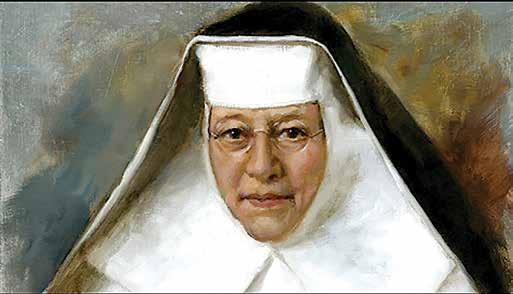
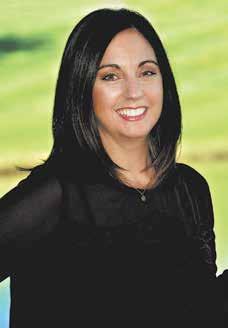

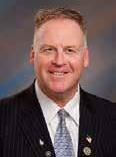
a calling to start evangelizing through music,” Murphy said. “His music is unique because it takes the Catholic messages and adds a more contemporary beat to it. His message was so solid, and by the end of his performance I saw not only the younger men but men in their 50s and 60s getting into his message. It’s all part of the effort to reach out to the younger men by doing something new, and at the end of the conference a lot of them thanked us for the outreach.”
Next year’s conference is tentatively scheduled for Feb. 25, 2025, and will feature a visit from Bishop Jacques FabreJeune of the Diocese of Charleston, S.C.
More online
At www.catholicmenofthecarolinas.
org : Learn more about the Catholic Men’s Conference of the Carolinas.
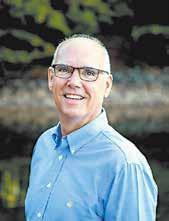
do for her and her baby.”
The sisters led a Lenten reflection on Feb. 16 at St. Thomas Aquinas Church. Sister Catherine spoke to attendees about the deep proofs of God’s love for us and how reflecting on His deep love for us is essential as we journey through Lent.
“She spoke about our guardian angels as one amazing proof of God’s love for us, having created a guardian for us even before He created the world,” said Tim Flynn, director of parish operations.
The sisters also led Parish Catechist Training on Feb. 17, centered on the theme of “Sharing the Gift of Vocation.”
Sister Catherine shared how the focus on joy and the value and dignity of each person can be very helpful in
opening up young people to the idea of a vocation, whether to the consecrated life, priesthood or married life.
“Without an abiding sense of trust in the love of God, it is difficult to embrace any vocation, and so it is vital for parents and catechists to instill this in young people,” she said.
Flynn noted how special the sisters’ visit was.
“It was truly a blessing to have the Sisters of Life here at St. Thomas Aquinas,” Flynn said. “They were able to share not only practical wisdom, but who they are. It was a powerful witness to the great need we have in the Church for this visible witness to the beauty and attractiveness of giving one’s life totally for God as a consecrated religious sister.”
Sister Joseph Mary closed the day with prayer.
“Sometimes we go at life grasping, but let’s turn our hands over and let’s listen and receive,” she said. “Let us find where we can share the joy, love and resurrection with others in our lives.”
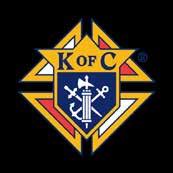
VIENE DE LA PÁGINA 15
física y mental y presentar síntomas, físicos, emocionales, de comportamiento y cognitivos que puede interferir con nuestra vida”, afirmó. El dolor de cabeza, la hipertensión, el cansancio, la ansiedad, irritabilidad, enojo, frustración, sensación de vacío, falta de propósito, soledad, malhumor, poble concentración, la impulsividad y preocupación contínua, señaló, son algunos síntomas del estrés crónico.
Sin embargo, ante este mal, dijo, hay técnicas efectivas para manejarlo, “como la de respiración, relajación, gratitud entre otras y diferentes estrategias para fortalecer la resiliencia, actividades que ayudan a manejar el estrés como: disfrutar la naturaleza; practicas espirituales como la oración, y la meditación; el ejercicio regular; una dieta saludable; hacer actividades creativas como pintar, dibujar, escribir o realizar manualidades; socializar; establecer una rutina; realizar actividades placenteras; y acudir a un consejero o terapeuta que pueda ayudarte a encontrar las fuentes de tu estrés y a aprender nuevos medios para afrontar situaciones difíciles”.
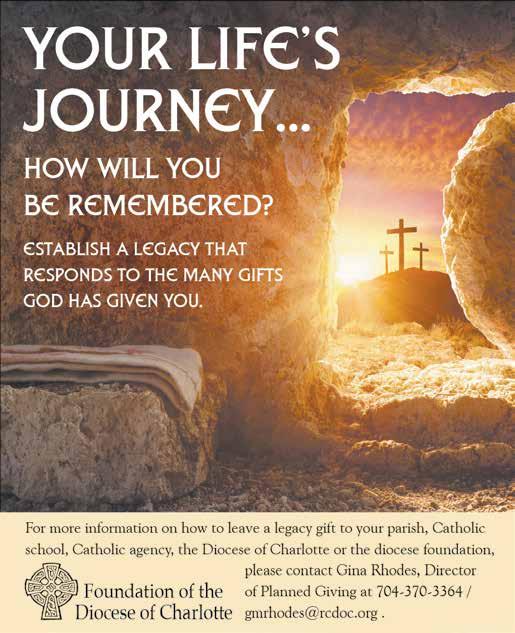

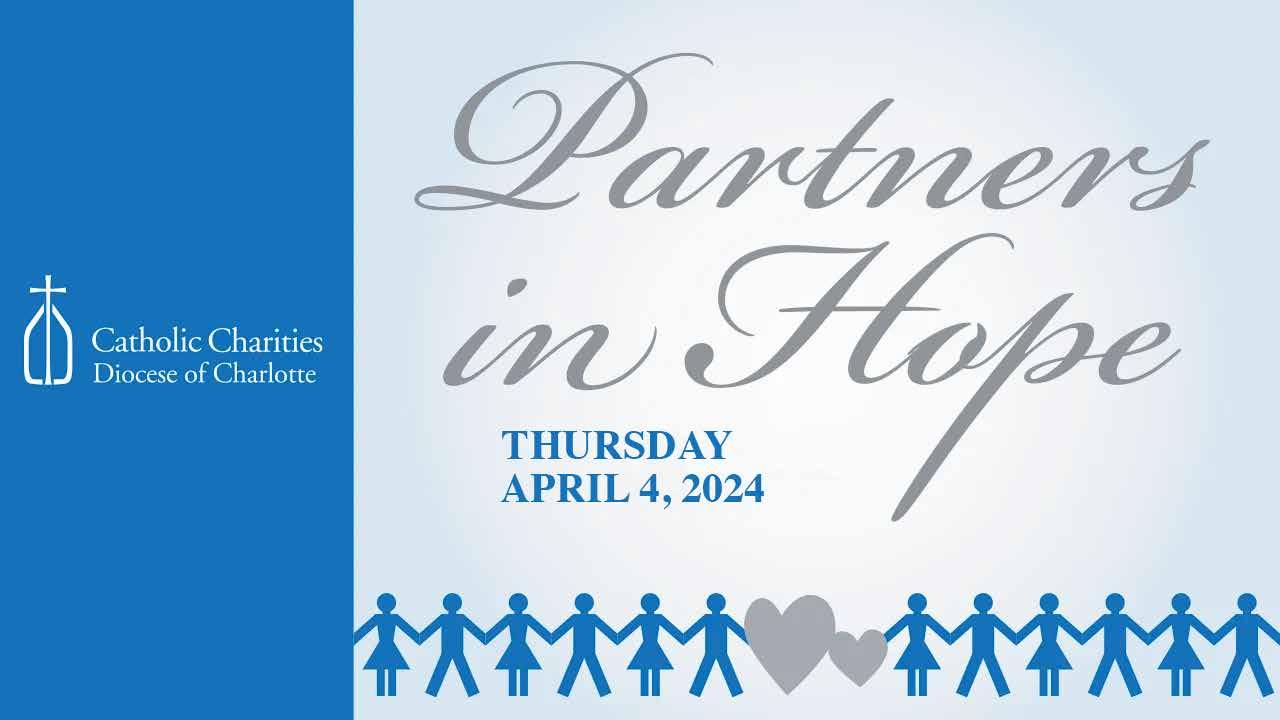


of the Faith known as “Donum Vitae” (“The Gift of Life”) states the Church opposes in vitro fertilization and related practices, including gestational surrogacy, in part because “the connection between in vitro fertilization and the voluntary destruction of human embryos occurs too often.”
MONTGOMERY, Ala. — An Alabama Supreme Court ruling that frozen embryos qualify as children under state law has raised complex legal questions about artificial reproductive practices opposed by the Catholic Church.
The ruling responded to appeals brought by couples whose embryos were destroyed in 2020, when a hospital patient removed frozen embryos from storage equipment, destroying them. The 8-1 opinion said the state’s highest court has previously held “that unborn children are ‘children’ for purposes of Alabama’s Wrongful Death of a Minor Act ... a statute that allows parents of a deceased child to recover punitive damages for their child’s death.”
The judges found that parents’ ability to sue over the wrongful death of a minor child applies to unborn children.”
Elizabeth Kirk, co-director of the Center for Law & the Human Person at The Catholic University of America Columbus School of Law in Washington, said the ruling was “narrow” and “specifically avoided reaching broader questions.” The 1987 document from the Congregation (now Dicastery) for the Doctrine
One health system has already suspended IVF treatments in response. Kirk said, “All of us should welcome laws and court decisions that comport with the truth of the human person, including the dignity of all human life from conception to natural death.”
PHILADELPHIA — The shrine of a beloved saint sustained an estimated $20,000 worth of damage in an apparent act of vandalism.
Panels of three stained-glass windows were shattered at the National Shrine of St. John Neumann in Philadelphia in the early morning hours of Feb. 19. The windows, depicting scenes from the 19th-century Redemptorist’s life, are located in the lower church of the shrine, which is housed at St. Peter the Apostle Church.
The saint’s remains – covered by a wax mask and vestments, and encased in glass beneath the altar of the lower church – were unaffected by the attack. Staff at the shrine “discovered that someone had thrown a brick and stones” through the three windows, said Kenneth A. Gavin, chief communications officer of the Archdiocese of Philadelphia. Detectives are investigating, and the incident may be related to similar vandalism that took place during the same time period at a historic AME Episcopal church, a theater company and a law firm.

ST. PAUL, Minn. — Minnesota lawmakers in the state’s House and Senate are considering a bill that would allow people to request medical aid in dying under certain circumstances.
The Minnesota Catholic Conference, which represents the public policy interests of the state’s bishops, said in a recent action alert the bill is “one of the most aggressive physicianassisted suicide bills in the country” and violates the teaching of the Catholic Church.
“As Catholics, we are called to uphold human dignity,” the conference wrote. “Legalization of assisted suicide works against this principle because death is hastened when it is thought that a person’s life no longer has meaning or purpose.”
Under the measure, to be eligible for physician-assisted suicide, one must be 18 or older, be diagnosed with a terminal illness and a prognosis of six months or less to live and be mentally capable of making an informed health care decision.
Committees in the Senate and the House must act favorably toward the bill by a March 22 deadline to keep the legislation in play. Despite the opposition of pro-life leaders, many physicians, people with disabilities and mental health experts, the House Health and Finance Policy Committee passed the bill Jan. 25. The bill will have to clear other committees before a full vote on the House floor. As of Feb. 27, no additional hearings had been scheduled.
EL PASO, Texas — Catholic leaders and local officials condemned an attempt by Texas Attorney General Ken Paxton to shut down a Catholic nonprofit in El Paso serving migrants and asylum-seekers, calling it an abuse of power and a violation of religious liberty.
Paxton’s office accused El Paso’s Annunciation House of “facilitating illegal entry to the United States” and “human smuggling,” filing a lawsuit in an attempt to shut it down.
Ruben Garcia, director of Annunciation House, told reporters at a Feb. 23 press conference that for nearly 50 years the group has been providing basic resources such as food, shelter and water to migrants and refugees who arrive at the border, in consultation with the U.S. Border Patrol.
“There are individuals who have decided that that should be illegal,” he said. Garcia took particular umbrage with Paxton’s characterization of their Catholic ministry to migrants as “smuggling” and their houses of hospitality as “stash houses,” saying, “Is there no shame?”
Jerome Wesevich, a Texas RioGrande Legal Aid attorney representing Annunciation House, said, “Paxton compounds his abuse of power by focusing it on a religious organization that is putting the Catholic faith into practice.” — OSV News



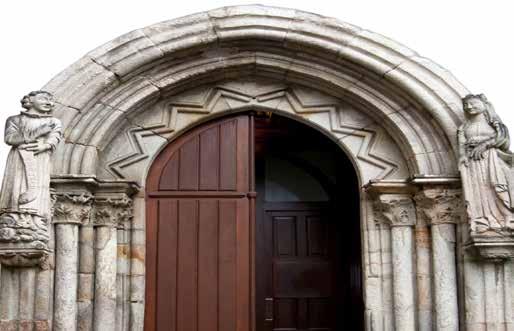

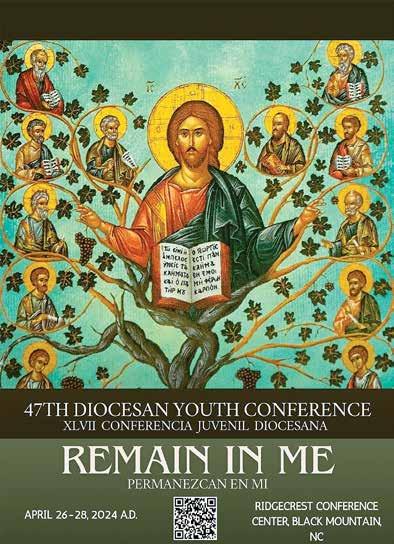
Priest, religious brothers kidnapped in Haiti in another wave
PORT-AU-PRINCE, Haiti — As more violence torments gang-decimated Haiti, six male religious, a lay teacher and a priest were kidnapped in two separate incidents Feb. 23 in Port-au-Prince, Haiti’s capital. The six members of the Congregation of the Brothers of the Sacred Heart were abducted on their way to the John XXIII School, which is run by the order. A teacher who was with them was also taken.
“In view of this painful event, the John XXIII institution is closing its doors until further notice. The other institutions of the Brothers of the Sacred Heart throughout the country will continue the work of raising awareness among the new generation of the values of living together in harmony, with a view to the emergence of a new society that is more humane, more caring, and more united,” said the congregation in a statement sent to ACN.
Only a few hours later, a priest was also kidnapped in Port-au-Prince. He was taken from his parish church, alongside some of the faithful, soon after celebrating morning Mass. Despite the tireless work of the church, clergy and religious have not been spared the violence of armed gangs.
VATICAN CITY — After deadly attacks killed 15 people at a Catholic church and dozens more at a mosque in West Africa’s Burkina Faso, Pope Francis said places of worship must be respected. “Recalling that hatred is not the solution to conflicts, the pope invites (people) to respect sacred places and to fight against violence with the aim of promoting the values of peace,” he urged via telegram sent Feb. 26 to the president of the bishops’ conference of Burkina Faso, Bishop Laurent Dabiré of Dori. Bishop Dabiré reported that jihadists broke into the chapel in the small village of Essakane during a prayer service the morning of Feb. 25 and began shooting at men present but spared the women. Twelve people were killed during the attack; three died later from their wounds, he said. Pope Francis was “deeply saddened” to learn of the attack and “joins the families in mourning, expressing his closeness and sorrow,” the telegram said. “His Holiness also expresses his sorrow to the Muslim community for the attack on a mosque in Natiaboani.”
VATICAN CITY — Anti-personnel mines are “devious” weapons that continue to kill innocent civilians and children long after a conflict has ended, Pope Francis said. “I thank all those who offer their help to assist victims and clean up contaminated areas,” he said at the end of his weekly general audience in the
Paul VI Audience Hall Feb. 28. “Their work is a concrete response to the universal call to be peacemakers, taking care of our brothers and sisters,” he said. The pope, who was still dealing with a cold, read aloud his remarks about landmines after having aides read his lengthier catechesis and greetings during the audience. March 1 marks the 25th anniversary of the entry into force of the Ottawa Convention, which prohibits the use, stockpiling, production and transfer of anti-personnel mines and mandates assisting victims, clearing minefields and destroying stockpiles. Anti-personnel mines, the pope said, “continue to target innocent civilians, particularly children, even many years after the end of hostilities.” “I express my closeness to the many victims of these devious devices, which remind us of the dramatic cruelty of war and the price civilian populations are forced to pay,” he said.
— OSV News
CATHOLIC NEWS HERALD I
Caring for Charlotte Area Catholic Families in Their Hour of Need Since 1926
McFUNERAL SERVICE, INC.
Charlotte 704-334-6421
Pineville 704-544-1412
Mint Hill 704-545-4864
Derita 704-596-3291

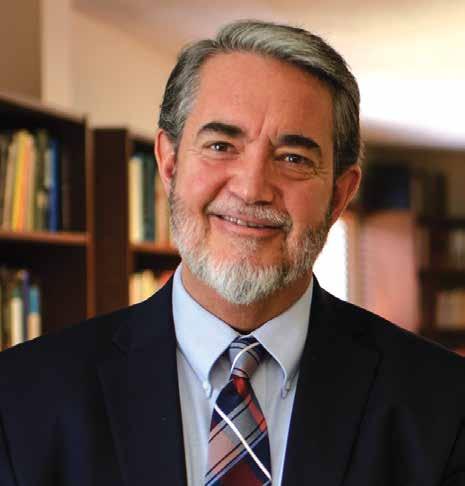

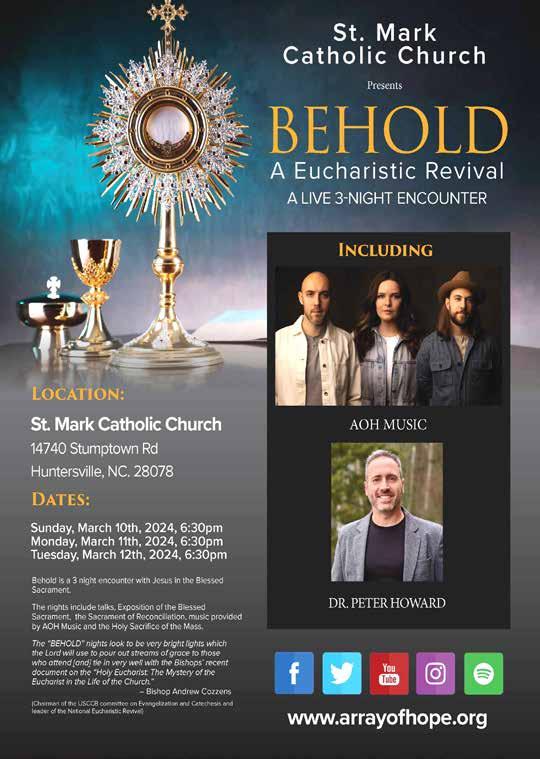


Gretchen Crowe
This June will mark 202 years since Bishop John England started the United States Catholic Miscellany in 1822. Lies were being spread about the faith, and Catholic immigrants were finding themselves the subject of Nativist attacks. Bishop England will forever be remembered as the first bishop to take a stand in defense of the Church by starting a local Catholic newspaper.
Many other Church leaders followed in his footsteps at the diocesan and national levels. Ninety years after Bishop England, Father John Francis Noll began publishing Our Sunday Visitor, also to defend the
‘The mission of the Catholic press to share Christ’s truth with the world has never been more critical.’
faith from those who were attacking it. The first print run was 35,000, and circulation peaked at over 1 million. The Church in the United States was facing a crisis – an attack on both its people and its teachings –and communication was effectively used as a tool to combat it.
The fathers of the Second Vatican Council encouraged this kind of “good” Catholic press to “instill a fully Christian spirit into readers” (“Inter Mirifica,” 14). This press has two main objectives, they said: to share and explain what’s happening in the life of the Church, and to form, support and advance public opinion that was in line with Catholic teaching and with the natural law.
THE DEVIL’S ATTACKS PERSIST
Though the attacks on the Church – the attacks against Christ Himself – have changed in nature over the years, they are far from over. The devil’s tentacles are long and relentless. Research released in January by Pew indicates that 28% of U.S. adults are now religiously unaffiliated. Even with the defeat of Roe v. Wade, the gospel of life is incessantly under attack at the state level, where protection for abortion is finding general support.
Forces in our culture, much of them through social media, are loudly and persuasively convincing our children that
a person’s biological identity comes not from the Creator, but from one’s whim of the moment. Pornography is rampant. Human trafficking is a multibilliondollar industry. The poor continue to be marginalized.
The Eucharist – Christ’s gift to the Church by which to remember Him, and the source and summit of what it means to be Catholic – is so forgotten that we have to spend millions of dollars on a National Eucharistic Revival. Within the Church, we face our own reckonings, the most wretched of which is without a doubt the clergy sexual abuse crisis, which continues to rear its ugly head even 20 years after the Dallas Charter and four years after a global abuse summit at the Vatican.
The mission of the Catholic press to share Christ’s truth with the world has never been more critical.
And yet it is also a time of great transition within Catholic media, where changes in media consumption and decreasing readership are leading to revisions of strategy in how content is being delivered on a local and national level. On the whole, this is a healthy practice. If current strategies aren’t effective, they should be examined and improved upon. But what we cannot do –what we must not do – is change what we are communicating. We cannot stop using the media to tell the story of the Church and to share the teachings of the Church in a way that helps Catholics “formulate Christian judgments for themselves on all events” (“Inter Mirifica,” 14).
If we don’t do it, who else will?
I was blessed recently to attend a talk given by Deacon Larry Oney of the Archdiocese of New Orleans, founder and president of Hope and Purpose Ministries, who called for a reinvestment of resources in evangelization and truth-telling through media.
“If we’re going to do Catholic media the right way, let’s do it in an excellent way,” he said. “The Church has to be reoriented (as to) where we are going to spend our money. Some of it needs to be spent in the new frontier, and part of that frontier for evangelization is definitely media –written media, digital media, all of it. We can’t abdicate that. It’s too important, because the battle is being fought there principally.”
And he is so right. Catholic media are too important to abandon, despite the many challenges associated with it. For it is through Catholic media that we communicate Christ.
GRETCHEN R. CROWE is the editor-in-chief of OSV News.

In Roman Catholic parishes, the rituals of Lent begin with the imposition of ashes on Ash Wednesday. But many Eastern Christians – both Catholic and Orthodox – set the tone for the penitential season of Lent by observing another tradition: Forgiveness Sunday. The “Great Fast” is ushered in at vespers (evening prayer) on the Sunday before Lent with a rich and meaningful tradition. As the beginning of Lent is announced, light-colored vestments are exchanged for dark ones, candles are extinguished, and the chants become
‘Forgiveness doesn’t erase what we’ve suffered ... When we forgive someone, we are choosing to place another human being above our hurts.’
somber. The Prayer of St. Ephrem, a penitential mainstay in the East, is then prayed for the first time. But the highlight of the service is deeply personal: The Ceremony of Mutual Forgiveness. It begins with the priest saying, “Brothers and sisters, forgive me, a sinner, all the sins I have committed this day and all the days of my life, in word or deed or thought, with all my spiritual and bodily faculties.” The congregation responds, “May God forgive you and have mercy on you.” The roles then reverse, with congregants asking forgiveness from the priest, and the priest responding in kind. An exchange of mutual forgiveness between individuals follows for as long as needed. People approach one another with the words, “Forgive me, a sinner.” They are answered with the response, “May God forgive you.”
I can’t think of a better way to begin our Lenten observances than by embracing the challenge and call to forgive one another. Too often, we make forgiveness a goal rather than a starting place. Perhaps it’s because we don’t have an established way to experience it in the context of community. Without that, it’s easy to lose sight of how important mutual forgiveness is.
And, too, what forgiveness is – and what it isn’t – are often misunderstood. Granting forgiveness doesn’t mean we weren’t hurt. It is necessary only because we have been hurt, perhaps even deeply. Forgiveness doesn’t erase what we’ve suffered, or even lessen it. But when we forgive someone, we are choosing to place another human being above our hurts. That is what our merciful Father asks of us, and what Jesus shows us how to do throughout the Gospels.
But it’s important to remember that God does not ask us to forgive simply for the benefit of those who sin, but to show us a way out of the pain we continue to suffer until we do. Relationships need a way forward, especially when they are damaged or broken. Complete reconciliation may or may not be possible. But forgiveness keeps people from being stuck where they are. It empowers victims in a way revenge or retribution cannot.
We pray, “Thy kingdom come” often without thinking much about what it means. But when we do, it doesn’t take long for us to realize that asking for God to reign over every aspect of our lives requires something of us. God is the creator and king of the universe. Nothing would exist, or continue to exist, apart from Him. And because everything is from Him, everything is also for Him.
GIVE THE WORLD BACK TO ITS CREATOR
Our task is to give the world back to the one who loved it into being. That’s easy to embrace when we’re talking about mountains, meadows and moose. It’s more challenging to allow God to rule over human affairs. How that might grow in our communities of faith is something we ought to consider.
When the kingdom of God comes to our relationships, forgiveness flows. To live a life of faith in Jesus Christ means learning to forgive frequently and freely, as he did. It means recognizing when a brother or sister has something against us. It requires us to set the Lenten sacrifices we want to make to God down at the altar and go instead to ask for forgiveness. And it also demands that we grant forgiveness to all who seek it from us, even when it’s difficult for us to do so. Forgiveness Sunday may not be part of our own faith traditions, but there is nothing stopping us from setting aside a time for mutual forgiveness. Our families, schools, parishes and workplaces must create opportunities to ask for and offer the mercy we all need from one another. When we do, we will unlock the power of forgiveness in our lives to heal, restore and transform.
JAYMIE STUART WOLFE is a Catholic convert, freelance writer and editor, musician, wife and mother of eight in New Orleans.
 Dr. Tod Worner
Dr. Tod Worner
Shhhh.
Do you hear that?
That’s right – Nothing.
Silence.
What an odd – even overwhelming – sound. In an age of incessant din (jabbering televisions at gas pumps, endless iPhones chirping in cars, oppressive chatter in libraries), silence can seem curiously strained, if not a little awkward. Unconsciously, we wait for the noise to begin again. It heralds a sense of “normalcy.” And yet we need silence; inwardly, we crave it.
Opening his poem “Long-Legged Fly,” W.B. Yeats affords us a stealthy look at Caesar considering a matter of seismic importance. He is not conferring with his staff or watching noisy maneuvers. For such a moment, with maps spread and hand on his head, he needs silence.
That civilization may not sink, Its great battle lost, Quiet the dog, tether the pony
To a distant post.
Our master Caesar is in the tent
Where the maps are spread, His eyes fixed upon nothing, A hand upon his head.
Like a long-legged fly upon the stream His mind moves upon silence.
While silence can be solitary, it can also be communal. Playing pool in my favorite lake lodge, I always marveled at the oftselected jukebox selection: Two Minutes of Silence. After Fleetwood Mac faded away and before Billy Joel tickled the ivories, quiet ensued for two whole minutes while people smiled warmly and leaned into their conversations.
Once, when I was a young boy itching to break an extended silence that hung over several of us in my family room, my father observed that such quiet is possible only when people are truly comfortable with each other.
Sigurd Olson, the godfather of the pristine Boundary Waters Canoe Area, spent years guiding over-busy, noise-addled professionals into the heart of the silent wilderness. Days of quiet interrupted only by the shake of late summer leaves or the cry of a mournful loon were, initially, unwelcome, if not unnerving. And yet, before long, the peace was a balm.
To discover that silence is not a yawning void to be filled, but an earnest companion to be cherished – one who sharpens your thoughts, warms your heart, and ennobles your soul – is to, once again, discover the pleasure of what it means to be human. Time and again, Olson implored his charges to relish the silence. “At times on quiet waters,” he wrote, “one does not speak aloud but only in whispers, for then all noise is sacrilege.”
Silence can mediate graces. Interviewed on a late-night television show, Louis C.K. – a rather edgy comedian – mused on the time, while driving, when a Bruce Springsteen song triggered a painful memory. Immediately uncomfortable, he struggled to suppress the thoughts with
any noise or distraction possible. But instead, he pulled over, silenced the radio, and wept. It was difficult, he admitted. But it was good.
Father Romano Guardini, en route to the orchestra, described the noise and distraction we endure in the mad dash through traffic to arrive on time. Even if we arrive as the opening notes try to soothe, he lamented, we are, initially, impervious to their charms – we are still not there. Instead, our souls are stuck in traffic amid honks and screeches, curses and apologies. If only we had a small dose of preparatory silence, we might have been open to such graces.
Silence is formative. Robert Cardinal Sarah observed that “contemplative silence is a fragile little flame in the midst of a raging ocean. The fire of silence is weak because it is bothersome to a busy world.”
Pope Benedict XVI would add, “Put simply, we are no longer able to hear God – there are too many different frequencies filling our ears. What is said about God strikes us as pre-scientific, no longer suited to our age. Along with this hardness of hearing or outright deafness where God is concerned, we naturally lose our ability to speak with him and to him. And so we end up losing a decisive capacity for perception. We risk losing our inner senses. This weakening of our capacity for perception drastically and dangerously curtails the range of our relationship with reality in general. The horizon of our life is disturbingly foreshortened.
Silence is a vast space of interiority, the landscape of the soul. It is not proud or ostentatious. It is not shallow or selfish. It accompanies Christ in his Passion and Mary in her Compassion (Pietà). It speaks volumes without speaking.
Thomas Merton went further by eulogizing our interior life, which collapses in the absence of silence. Silence affords the opportunity for a holy secrecy –antithetical to boisterous sharing and testifying – between God and ourselves.
“[We must learn that] the inviolability of one’s spiritual sanctuary, the center of the soul, depends on secrecy. Secrecy is the intellectual complement of a pure intention. ... Keep all good things secret from yourself. If we would find God in the depths of our souls, we have to leave everybody else outside, including ourselves.”
Silence, to borrow from (and paraphrase)
Thomas Merton once more, “allows us to find ourselves and lose ourselves at the same time.”
If only we truly understood this.
Shhhh.
Do you hear that?
That’s right – Nothing.
Silence.
And, with it, the stirrings of the soul.
DR. TOD WORNER is a practicing internal medicine physician; managing editor of Evangelization & Culture, the Journal of the Word on Fire Institute; and host of the Evangelization & Culture Podcast.

‘There will always be martyrs among us. This is a sign that we’re on the right path.’
Pope Francis
From online story: “The courage of Christian martyrs is a blessing for everyone, pope says”
The Catholic News Herald reached the Facebook and Instagram feeds of more than 92,500 people in English and Spanish last month. The most talked about post?
Diocese-wide coverage of Ash Wednesday. Join the conversation: www.facebook.com/ CatholicNewsHerald
On YouTube in February, videos produced by the Catholic News Herald were viewed more than 18,000 times. The most popular video? “Catholic athlete runs in Adoration.”
So far this month, 32,500 visitors to www.catholicnewsherald.com have viewed a total of 46,000 pages. The top 10 trending headlines are: n
The Catholic News Herald welcomes letters from readers. We ask that letters be originals of 250 words or fewer, pertain to recent newspaper content or Catholic issues, and be written from a perspective of Christian charity.
To be considered for publication, each letter must include the name, address and daytime phone number of the writer for purpose of verification. Letters may be condensed due to space limitations and edited for clarity, style and factual accuracy.
The Catholic News Herald does not publish poetry, form letters or petitions. Items submitted to The Catholic News Herald become the property of the newspaper and are subject to reuse, in whole or in part, in print, electronic formats and archives.
E-mail: catholicnews@rcdoc.org
Mail: Letters to the Editor
Catholic News Herald
1123 S. Church St. Charlotte, N.C. 28203

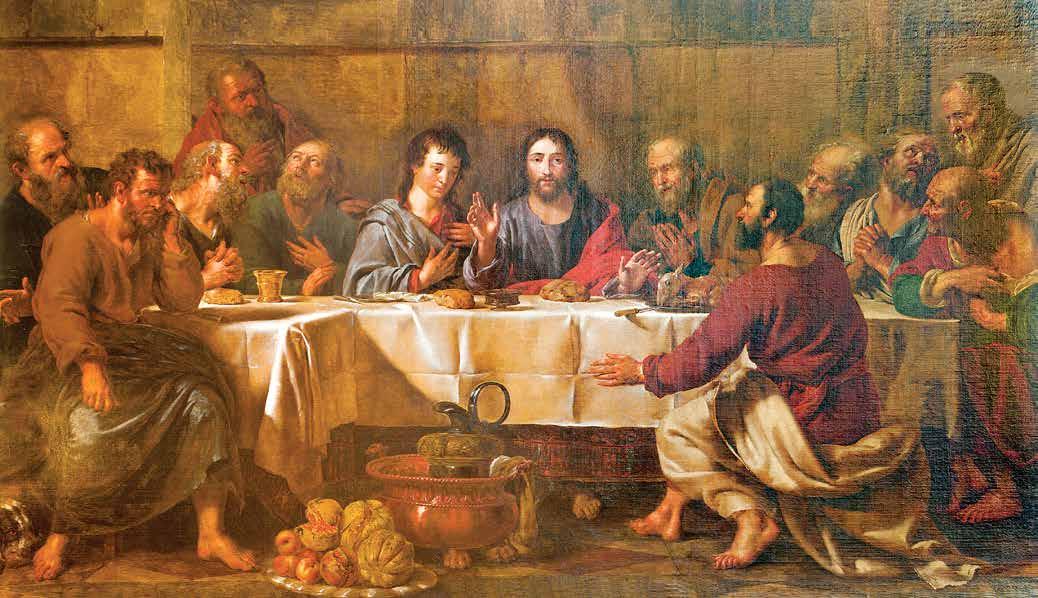


The Bishop’s Youth Pilgrimage, held each spring on the campus of Belmont Abbey College, is designed to provide young people of the Diocese of Charlotte with a day of reflection, prayer, formation, vocation awareness and fellowship. It is a component of the annual Diocese of Charlotte Eucharistic Congress. During the day-long event, which runs from 8 a.m. to 3 p.m., youth enjoy live music, a vocations fair and motivational speakers, as well as Eucharistic Adoration and a Eucharistic Procession on the historic Belmont Abbey College campus. There are separate program tracks for middle and high school students, and the sacrament of confession is also available.

